STANLEY KUBRICK'S Full Metal Jacket
Shot-by-Shot Analysis
Part Three

Go to TOC for this film ( (which has also a statement on purpose and manner of analysis and a disclaimer as to caveat emptor and my knowing anything authoritatively, which I do not, but I do try to not know earnestly, with some discretion, and considerable thought).
TOC and Supplemental Posts | Part 1 | Part 2 | Part 3 | Part 4 | Part 5 | Part 6 | Part 7 | Part 8 | Films Home
LINKS TO SECTIONS OF THE ANALYSIS ON THIS PAGE:
One of These Days These Boots Are Going to Walk All Over You, Shots 215 through 226
Stars and Stripes Meeting, Shots 227 through 252
January 30, 1968, Shots 253 through 283
How's it Going to Look if You're Killed Wearing a Peace Symbol, Shots 283 through 288
How Can You Shoot Women and Children, Shots 289 through 308
I Think I was Trying to Suggest Something About the Duality of Man, Shots 309 through 317
215 LS of a city street scene in Vietnam. Start "These Boots are Made for Walkin'" and slow zoom in on the corner across the street as there enters from screen right foreground a woman in a black leather mini-skirt, slit up each side. She crosses the street, zeroing in on Joker and Rafter Man. Though this woman is the decided focus, the street is filled with families, children, and women in more traditional Vietnamese attire. (45:00)

216 MS of Rafter Man and Joker seated at a cafe table on the corner, beers on the table, a camera set between them. The woman enters screen right. (45:40)

WOMAN IN MINISKIRT (cigarette in her right hand, shimmying, posturing):
Hey, baby. You got girlfriend Vietnam?
JOKER:
Not just this minute.
WOMAN IN MINISKIRT:
Well, baby, me so horny. Me so horny. Me love you long time. You party?
JOKER:
Yeah, we might party. How much?
WOMAN IN MINISKIRT: Fifteen dollar.
JOKER: Fifteen dollars for both of us.
WOMAN IN MINISKIRT: No. Each you $15. Me love you long time. Me so horny.
JOKER: Fifteen dollar too beaucoup. Five dollars each.
WOMAN IN MINISKIRT: Me sucky-sucky. Me love you too much.
JOKER:
Five dollars is all my mom allows me to spend.
WOMAN IN MINISKIRT:
Okay. Ten dollar each.
JOKER
What do we get for $10?
WOMAN IN MINISKIRT:
Everything you want.
JOKER: Everything?
WOMAN IN MINISKIRT:
Everything. (She coughs.)
JOKER (to Rafter Man):
Well, old buddy, feel like spending some of your hard-earned money?
RAFTER MAN:
Just a minute. (Takes photos of the woman and Joker.)
JOKER:
You know, half these gook whores are serving officers in the Vietcong. The other half have got TB.
217 MCU of Rafter Man continuing to take photos as a man approaches from behind. (47:10)
JOKER (off screen):
Be sure you only fuck the ones that cough.
The man who was approaching from behind, his eye on Rafter Man, grabs his camera.
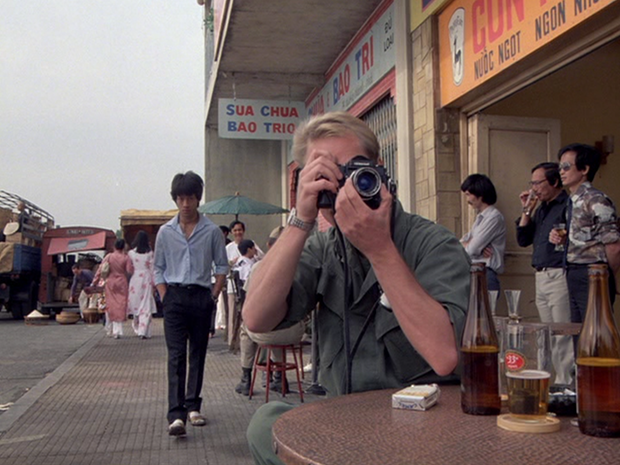
218 From the street corner behind the woman and Joker as the man who has stolen the camera runs toward the street. (47:15)
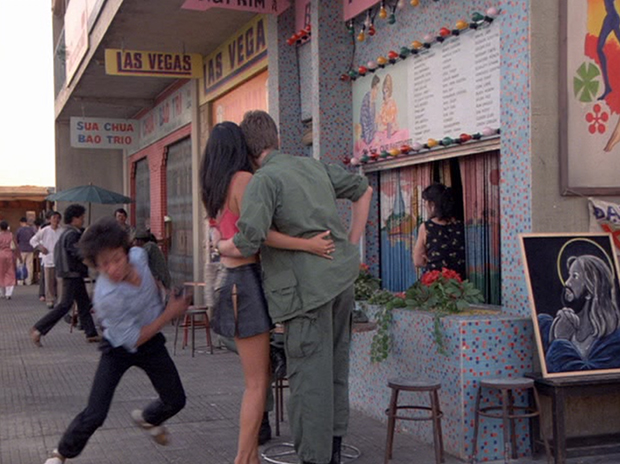

219 MCU from the side of the person who has stolen the camera, running away, while the Joker and the woman have barely had a chance to react yet. So this visual drops back slightly in time as shot 218 concluded with them both having already turned around to face the street in astonishment as the thief gets away. This shot finishes with the thief running into the street and tossing the camera to a waiting accomplice on a motorcycle. (47:16)
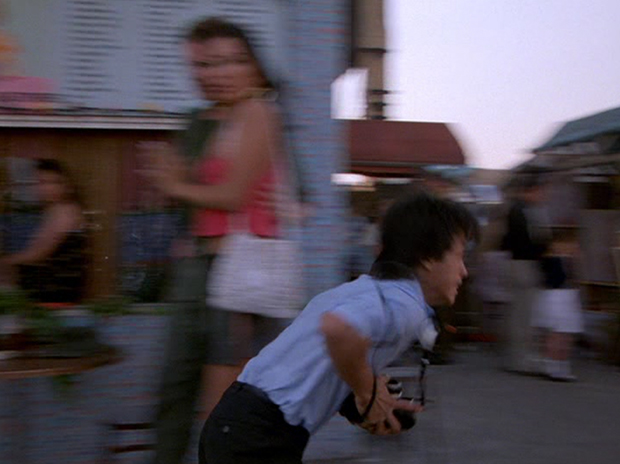
220 View of the thief and beyond him his accomplice on his motorcycle. The thief treats the Marines to a few flashy martial arts moves as if in warning not to come after him. (47:18)
221 Rafter Man having risen, he and the woman staring after the thieves, Joker responds with a playful martial arts kick, amused. (47:22)
222 The thief climbs onto the back of the motorcycle and they ride away. (47:24)
223 As in 221. (47:27)
224 The thief and his accomplice pass beyond a policeman directing traffic, and disappear down a side street. Begin crossfade... (47:31)
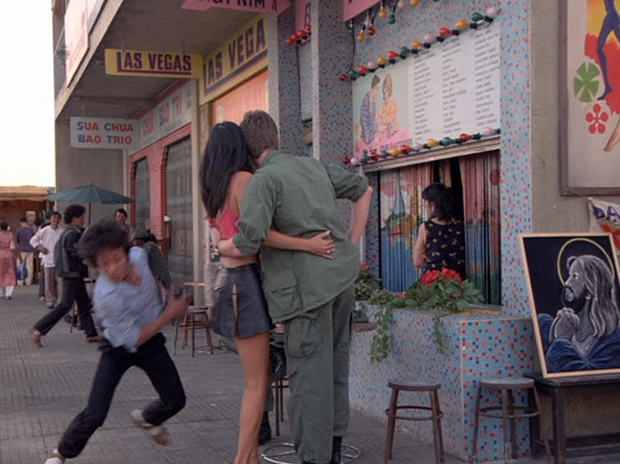 218 |
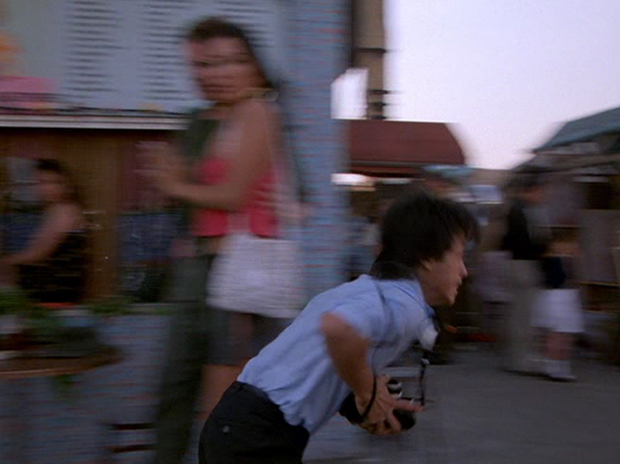 219 |
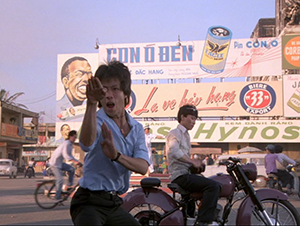 220 |
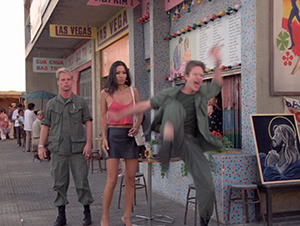 221 |
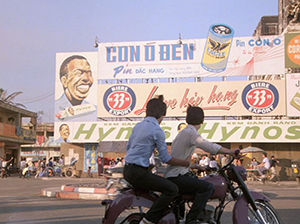 222 |
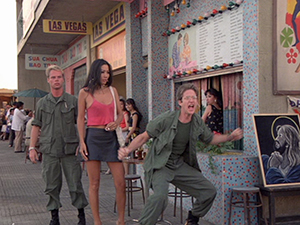 223 |
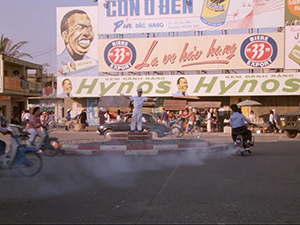 224 |
|
225 Crossfade from the city street to tanks amid palm trees and a helicopter flying in, tracking left with the helicopter as it pieces behind the gate for a U.S. Marine Corps Da Nang installation. (47:38)
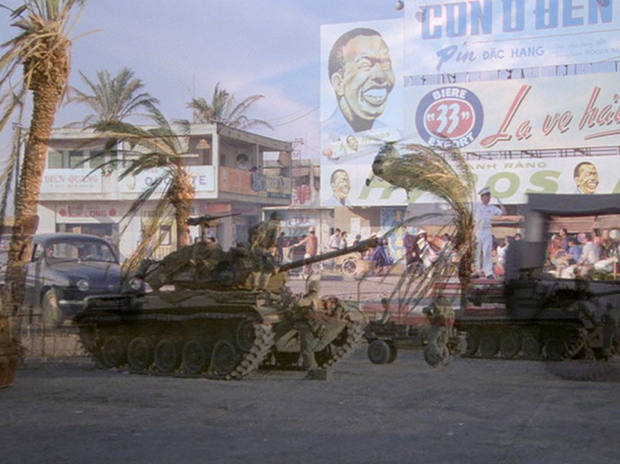
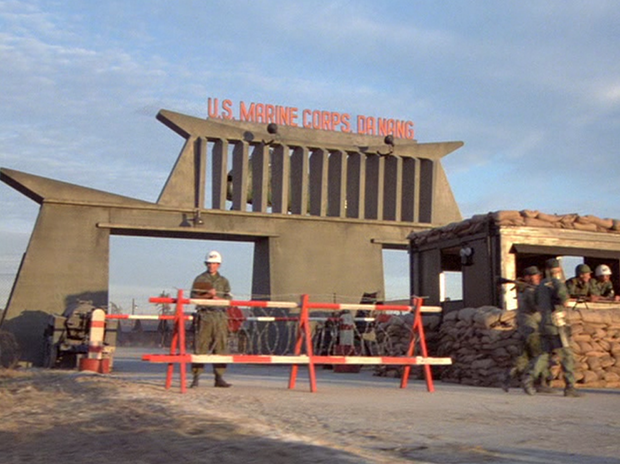
226 Crossfading to a medium shot of Joker and Rafter Man walking down a street on the base. Marines play ball in the background. (48:05)

JOKER:
That little sucker really had some moves on him, didn't he?
RAFTER MAN (carrying a coule of cases of Marlboro cigarettes)
Yeah.
You know what really pisses me off about these people?
JOKER: What?
RAFTER MAN: We're supposed to be helping them, and they shit all over us every chance they get. I just can't feature that.
JOKER: Don't take it too hard, Rafter Man. It's just business.
RAFTER MAN: I hate Da Nang, Joker. I wanna go out into the field. I've been in country almost three months and all I do is take handshake shots at award ceremonies.
JOKER: You'd get wasted your first day in the field and it'd be my fault.
RAFTER MAN: A high school girl could do my job. I wanna get out into the shit. I wanna get some trigger time.
JOKER: If you get killed, your mom will find me after I rotate back to the world and she'll beat the shit out of me. That's a negative, Rafter Man.
There were two popular documentaries on the Vietnam War in the late 1960s and undoubtedly Kubrick would have been familiar with them. The Anderson Platoon, from 1966/1967, was a French film by Pierre Schoendoerffer, his small crew embedded with the Army and named for the African-American platoon leader. Schoendoerffer, who had been a POW in Vietnam following the Battle of Dien Bien Phu, and who had already filmed, Platoon 317, based on a novel he'd written, had chosen Joseph Anderson's platoon due to its diversity. The movie, made for French television, with a theatrical release unexpectedly went on to win the 1967 Academy Award for Documentary Feature. Perhaps this inspired the Department of Defense to get in on the cinéma vérité documentary action for in 1968 a film giving the impression of cinéma vérité was released that focused on the Marines, A Face of War, directed by Eugene S. Jones, who had been a Marine and a Korean War news photographer. The film doesn't state it was a DoD production, and it's not given as being such on IMDB, and from what I can tell of what I've read of 1960s reception of the documentary, it may not have been known by the general public. Reviews I've read from the time seem to favor it even over The Anderson Platoon, Roger Ebert preferring how it didn't use music as as a binding element and for commentary as The Anderson Platoon did.
"Anderson Platoon" has cute effects (while GIs march through the mud, Nancy Sinatra sings "Boots Are Made for Walkin'"), "A Face of War" none. It does, however, show soldiers assisting at a battlefield birth and acting in the traditional manner ("Ain't he a tough little bastard? Hey, snookums, what you cryin' about? Upsy-daisy"). It is a deeply moving scene.
Also moving are the faces of the soldiers as they give frantic first aid to men caught by a booby trap; their faces late at night as they stand watch; their strained faces as they peer into the jungle for the enemy.
Neither film takes a position for or against the war. Schoendorffer and Jones let the events speak for themselves. But the French film is about Vietnam, a specific war. And the Jones film, which I hope finds a booking here, is not about Vietnam at all, but about the rifleman wherever he may be assigned: lonely, weary, proud, bitter and scared.
Source: Roger Ebert.com
But it seems to me that A Face of War is "win hearts and minds of Americans" propaganda, not by explicit preaching but by manipulation of the documentary form in the way it constructs a story. The Anderson Platoon shows a broader life of the Anderson platoon, including gambling, and a soldier on leave becoming involved with a Vietnamese prostitute on whom he quickly spends all his money, purchasing gifts for her. Material such as this wasn't going to make it into A Face of War.
Kubrick may have referenced The Anderson Platoon in Full Metal Jacket. The documentary briefly shows an army radio station that broadcasts music for the soldiers, and the DJ is announcing it's 2:17 as he begins to play "These Boots are made for Walkin'".
THE DJ: "... by Connie Smith on a country western tune there, the time right now 17 minutes past two. You're listening to armed forces radio am and fm right here in An Khe and music for you on a sunday afternoon. Matter of fact, Miss Nancy Sinatra, Boots Are Made for Walkin'."
We actually hear the last line of the 1965 Connie Smith song, beginning about about 9:09. The song is "The Threshold", and the last line is, "I hear him laughing now as I go walking out", the tune being about how the same threshold over which she was carried as a bride is the one over which she leaves, her husband having lost all love for her, laughing at her. So the DJ has a theme going of women who end up walking out on faithless partners. The Sinatra song runs from about 9:44 to 11:29, and is followed by a scene in which at 3:30 that afternoon the scout of the platoon hears an odd noise, which puts all on alert but turns out to be nothing, only a female baboon calling for her mate.
In Full Metal Jacket, "These Boots are Made for Walkin'" plays over shots 215 through 224. Also, at this point in the film, the only other popular music of the era that had been used was in the opening scene of the Marines' heads being shaved, the country-western song, "Hello, Vietnam".
You keep sayin' you've got somethin' for me
Somethin' you call love but confess
You've been a'messin' where you shouldn't 've been a'messin'
And now someone else is getting all your best
These boots are made for walkin'
And that's just what they'll do
One of these days these boots are gonna walk all over you
Ya
You keep lyin' when you oughta be truthin'
And you keep losing when you oughta not bet
You keep samin' when you oughta be a'changin'
Now what's right is right but you ain't been right yet
These boots are made for walkin'
And that's just what they'll do
One of these days these boots are gonna walk all over you
You keep playin' where you shouldn't be playin'
And you keep thinkin' that you'll never get burnt (ha)
I just found me a brand new box of matches, yeah
And what he knows you ain't had time to learn
These boots are made for walkin'
And that's just what they'll do
One of these days these boots are gonna walk all over you
Are you ready, boots? Start walkin'
Another documentary on the war that used this song was the 1966 Time of the Locust , by Peter Gessner, and was explicitly anti-war, American helicopters as locusts, questioning American presence in Vietnam principally through imagery, but most of the aggressions and killings it shows being conducted by Viet Cong. This film seems elsewhere to be credited as being the origin for the use of These Boots are Made for Walkin' in Full Metal Jacket. It enters at around 6:17 as a woman, depicted as a prostitute, stands with an individual on a sidewalk, perhaps beckoning him into a bar, followed by the shot of an ARVN soldier, a man bindfolded seemingly facing a firing squad, a clock, a bullet hole in a wall through which the camera peers, then military tromping through high water mud in the grass, the music ending at 6:52.
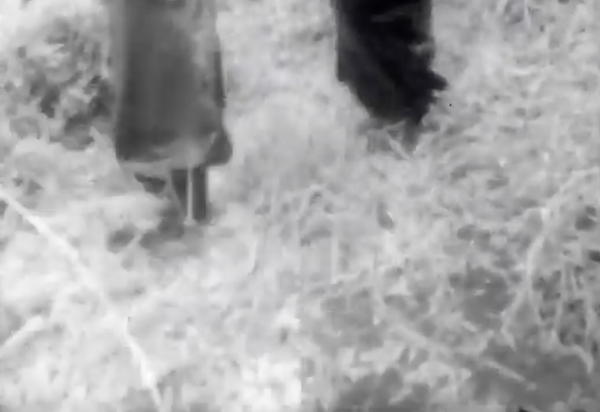
The song "These Boots are Made for Walkin'" plays over military walking through high water above in The Anderson Platoon, and military walking through high water below in Time of the Locust.
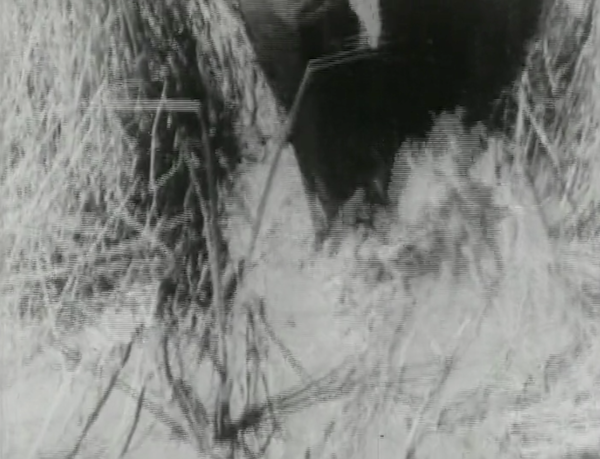
The use of the song in Gessner's film does link with the prostitute. However, I find it very compelling that the DJ in The Anderson Platoon states that a country-western tune had previously played--and that the only previously played popular music in Full Metal Jacket was a country-western tune. And I've discussed above my attention to 217, which the DJ states is the time. I would think Kubrick may have been referencing both movies. And it may be that the use of the song in The Anderson Platoon was referencing Time of the Locust. As I've explored in the boot camp section, we had Tribes referencing The D.I., and then Hasford seemingly referencing them both, and Kubrick quite conscious of this and drawing material from those films as well.
Because the Marines wear boots, and in both documentaries we see the military tromping through muddy waters in their boots, the song may be linked to the military walking over Vietnam, but the action in the scene involves Rafter Man's camera being stolen by a Vietnamese individual and he later opines they're supposed to be helping the Vietnamese but he feels shit all over in return, which he resents.
After Boot Camp, the 2nd section of The Short-timers opens with Joker revealing he's writing a book about Hill 327. I wouldn't be surprised if this, as a permutation of 237, was attractive to Kubrick, considering he also makes strong associations with The Shining via the character of Pyle.
From the book:
Tet: The Year of the Monkey.
Rafter Man and I spend the Vietnamese lunar New Year's Eve, 1968, at the Freedom Hill PX near Da Nang. I've been ordered to write a feature article on the Freedom Hill Recreation Center on Hill 327 for Leatherneck magazine. I'm a combat correspondent assigned to the First Marine Division. My job is to write upbeat news features which are distributed to the highly paid civilian news correspondents who shack up with their Eurasian maids in big hotels in Da Nang. The ten correspondents in the First Division's Informational Services Office are reluctant public relations men for the war in general and for the Marine Corps in particular. This morning my commanding officer decided that a really inspiring piece could be written about Hill 327, an angle being the fact that Hill 327 was the first permanent position occupied by American forces. Major Lynch thinks I rate some slack before I return to the ISO office in Phu Bai. My last three field operations were real shit-kickers; in the field, a Marine correspondent is just another rifleman. Rafter Man tags along behind me like a kid. Rafter Man is a combat photographer. He has never been in the shit. He thinks I'm one hard field Marine.
There are no interactions with prostitutes in The Short-timers. Instead, there are a couple of scenes in its sequel, The Phantom Blooper, that the film draws from.
As we walk past, one girl striking poses in front of the steam-and-cream calls out to me, "Hey, Captain, I think I love you. You got girlfriend Viet Nam?" She's a sexy black girl with a Vietnamese accent, wearing pink hot pants and high heels. Her yellow tank top is thin enough to leave nothing to the imagination. Her lips are too red with too much lipstick. "Ten dolla you. Number one fuckee. My name Peggy Sue. I love you too much. Sucky-sucky number one." Her voice is so snotty with contempt that you feel like slapping her face.
Rather than having a prostitute who tries to strike a deal with Joker and Rafter Man, and Rafter Man's camera being stolen, Gustav instead introduces the reader to Vietnam with Joker and Rafter Man visiting a movie theater to watch John Wayne's The Green Berets. At the theater, Joker runs into Cowboy and his men, then we follow Joker and Rafter Man back to the base. I'm going to reserve discusion on The Green Berets> until Part Six when I look at the cinema scene in Hue.
Gustav and Kubrick compare the relations of Americans in Vietnam with American Indians, and we have a hint of this here with the prostitute being dressed in a black miniskirt that resembles a loincloth.
The scene with the prostitute works much like the scene with the prostitute, Domino, in Eyes Wide Shut. Hesitant, injured by Alice's divulgence she had once almost left him for another, Bill allows himself to be picked up by a prostitute and visits her apartment. In a profile shot reminiscent of when Dave and Frank speak in a pod, in 2001, of the possibility of having to cut off HAL's higher brain function, and HAL lip-reads their conversation, Domino and Bill kiss, only to be interrupted by Bill's wife who has been watching on TV a film about a man who destroys his marriage by having an affair. This causes Bill to leave, which is fortunate as when Bill later returns to her apartment he finds she has left as she learned she has HIV. The theft of the camera in FMJ also means that Joker and Rafter Man likely don't carry out their association with the prostitute, who may or may not have TB or be associated with the Viet Cong. What is intended to be communicated in Eyes Wide Shut is the sense of Bill somehow being observed, just as HAL turns out to be reading the lips of Dave and Frank. At that point, we feel it's a simple matter of his wife wondering where he is and coincidentally calling at a critical moment. But after his visit to Somerton, we know he is in fact followed. And what if we are intended to have the same feeling in Full Metal Jacket?
Staring over the scene are the Hynos ads featuring what looks like a racist caricature of a what appears to be possibly a Black-Asian man smiling broadly. I have read he was was "Black", but I'm not sure if this is intended to mean an Indonesian of a dark complexion. The seeming purpose of the use of the dark-skinned man was to heighten the contrast of his bright white teeth.
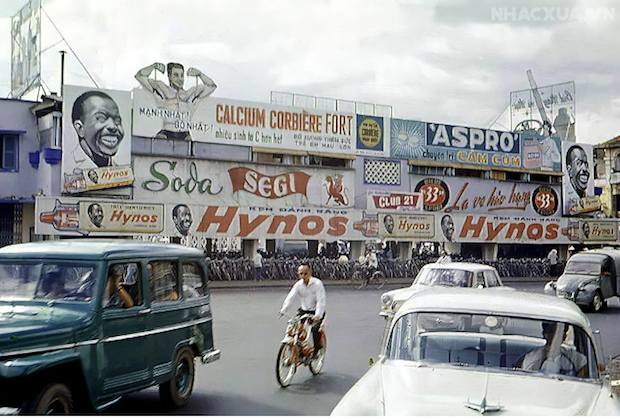
At that time, people used to call the dark-skinned Indo, Malay and Indian people living in Saigon as Bay Cha. Therefore, when the Hynos logo was released, Saigon people also called this toothpaste with another dear name, Bay Cha cream.
Source: A once-glorious brand: Toothpaste 'Brother Seven Cha' Hynos
Why Seven Cha? Because I read that from early on in the 20th century there was a caste system of 9 classes in Saigon-Cholon. The ninth being the lowest, the eighth belonged to the poor, small merchants, and "black people", and the seventh rung was that of "loan sharks, Indian tycoons [who were] often confused with Indonesians, so they are often called "Brother Seven Cha Va". (Source: Hierarchy in Communication of the Saigon//Cochinchine People blog post at Journey to the 'Nam)
I think "Black people", as given above, may not mean "African" but any individual of dark skin, light skin having become desirable and promoted in ads as upper-class, gentile. So, this totally confuses me, that toothpaste advertising would feature a dark-skinned person who would belong to a lower caste, and I have to wonder if it's the equivalent of the old Aunt Jemima and Uncle Ben.
The thief performing the martial arts move may reference a Hynos commercial which featured Hong Kong martial arts stars.
Mr. Vuong Dao Nghia was also the first person to know how to apply movies to advertising. At that time, he paid for the famous Hong Kong martial arts actors of the time, Vuong Vu and La Liet, to act in advertising films for Hynos. In the film, Vuong Vu plays the role of a bandit general, who commands the stage to attack the security convoy led by La Liet. The two sides fought to the death, until only Vuong Vu and La Liet remained. A jubilant martial arts battle took place and Vuong Vu was the winner. He opened the box of insurance, took it out and brought it to the front of the box… Hynos toothpaste. This trailer was shown before the main movie screening in Saigon cinemas at that time, creating an unforgettable effect.
Source: A once-glorious brand: Toothpaste 'Brother Seven Cha' Hynos
The same toothpaste ad stares over the Battle of Hue section in which Touchdown is killed, and the Marines contend with snipers firing on them out of another building over which is prominently displayed a name of another toothpaste.
Who is watching in that battle scene is the enemy, the sniper, one of the faces of which Joker eventually confronts at the film's end.
(I write more on this corner in the "Netherworld" section further down the page, in specific about "Las Vegas", the establishment next to where Joker and Rafter Man are seated.)
The crossfade from the city street to the base, in shots 224 and 225, makes it briefly appear as though cars have been replaced by tanks, anticipating the Battle of Hue.
This also reminds of similar shots in Kubrick's films, such as when Jack and his family are driving up to the Overlook on Closing Day, and a crossfade appears to show the VW driving right into the entrance to the lodge, whereas the VW will actually be taking a sharp left curve around the mountain..
Below is a film of Da Nang as it appears today, which is similar enough to the Da Nang of old that it revives memories for individuals who were there during the war. A number comment about how much they loved the city.
From the same Youtube source, also a video on what's it now like to ride through Dogpatch up Hill 327.
The film has Rafter Man back at the base carrying two cartons of Marlboros (though we see him smoking Camels later). As in the book, he's bored and anxious to get out where there's action.
After Cowboy and his squad are gone, Rafter Man and I watch a "Pink Panther" cartoon. Then we pick up our weapons and head for the PX, which looks like another warehouse. We buy junk food; pogey bait.
As we wait to pay for our pogey bait with military payment certificates, Rafter Man tries to find some words. "Joker, I want...I want to go out. I want to go out into the field. I been in country for almost three months. Three months. All I do is take hand-shake shots at award ceremonies. That's number ten, the worst. I'm bored. A high-school girl could do my job." He gives MPC's to a pretty Vietnamese cashier.
Outside, an apprentice Viet Cong forces me to submit to a boot shine while his older sister exhibits her breasts to Rafter Man.
"Relax, Rafter. You owe it to yourself. You'll be in the field soon enough."
"Come on, Joker, cut me a huss. How can I teach geography if I never see the world? Take me to Phu Bai. Okay?"
"Right," I say. "And then you'll get yourself wasted the first day you're in the field and it'll be my fault. Your mom will find me after I rotate back to the World. Your mom will beat the shit out of me. That's a negative, Rafter. I'm not a sergeant, I'm only a corporal. I'm not responsible for your scrawny little ass."
"Yes you are. I'm only a lance corporal."
Meeting Cowboy's Grunts at The Green Berets movie is what inspires Rafter Man to want to get out to where the action is. As we don't have the confrontation with the grunts yet in Full Metal Jacket, we may be given the impression that Rafter Man's having his camera stolen may be one reason he wants to get out and into the shit, seeing little difference between the North and South Vietnamese and eager for the opportunity perhaps to get out some aggression and get some payback.
Is it any wonder that Joker wouldn't want to be responsible for Rafter Man after his experience with Pyle?
227 MS of Lockhart in the journalist's quonset hut office, before the sign "First to go, last to know--We will defend to the death your right to be misinformed". (49:04)
LOCKHART: Okay, guys. Let's keep it short and sweet today. Anybody got anything new?
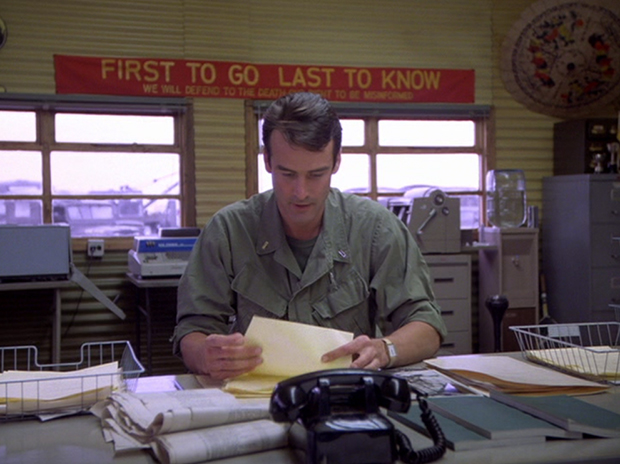
228 LS of the journalists gathered at the tables. (49:10)
JOKER: There's a rumor going around that the Tet ceasefire is gonna be canceled.
229 Lockhart as in shot 227. (49:15)
LOCKHART:
Rear-echelon paranoia.
JOKER (off screen):
A bro in intelligence says Charlie might...
230 MS of Joker and others from behind Lockhart's left shoulder. (49:19)
JOKER: ...try to pull off something big during Tet.
LOCKHART:
They say the same thing every year.
JOKER:
There's a lot of talk about it, sir.
231 MCU of Lockhart. (49:26)
LOCKHART:
I wouldn't lose any sleep over it. The Tet holiday is like the Fourth of July, Christmas and New Year all rolled into one. Every zipperhead in Nam, North and South, will be banging gongs, barking at the moon, and visiting his dead relatives.
232 MS of Joker as in shot 230. (49:37)
LOCKHART: Right. Ann-Margret and entourage are due here next week. I want someone there on the airfield and stick with her for a couple of days. Rafter Man, you take it.
RAFTER MAN: Aye, aye, sir.
233 Lockhart as in 231. (49:47)
LOCKHART:
And get some good low-angle stuff. Don't make it too obvious, but I wanna see fur and early-morning dew.
RAFTER MAN (off screen): Yes, sir.
LOCKHART: "Diplomats in dungarees. Marine engineers lend a helping hand rebuilding Dong Phuc village recently"... Chili, if we move Vietnamese, they are evacuees...
234 Journalists on the left side of the table. (50:03)
LOCKHART:
If they come to us to be evacuated, they are refugees.
CHILI: I'll make a note of it, sir.
235 Lockhart as in shot 233. (50:08)
LOCKHART: "NVA soldier deserts after reading pamphlets. A young North Vietnamese Army regular, who realized his side could not win the war deserted from his unit after reading Open Arms pamphlets." That's good, Dave. But why say North Vietnamese Army regular?
236 Shot of journalists on left as in 234. (50:22)
LOCKHART (off screen):
Is there an irregular? How about North Vietnamese Army soldier?
DAVE:
I'll fix it up, sir.
237 Shot of right side of room as in 228. (50:25)
LOCKHART: Lawrence Welk Show is out on TV in two weeks. Dave, do 100 words on it. AFTV will give you some background stuff.
DAVE: Sir.
238 Shot of Lockhart as in 235. (50:32)
LOCKHART: "Not while we're eating. NVA learned Marines on a search-and-destroy mission don't like to be interrupted while eating chow." Search-and-destroy. Uh, we have a new directive from MAF on this.
239 Shot of Joker and Rafter Man from left of Lockhart as in 232. (50:42)
LOCKHART: In future, in place of search-and-destroy, substitute the phrase sweep-and-clear. Sweep-and-clear, got it?
JOKER: Got it. Very catchy.
240 Shot of Lockhart as in 238. (50:49)
LOCKHART: And, Joker, where's the weenie?
241 MCU of Joker. (50:52)
JOKER: Sir?
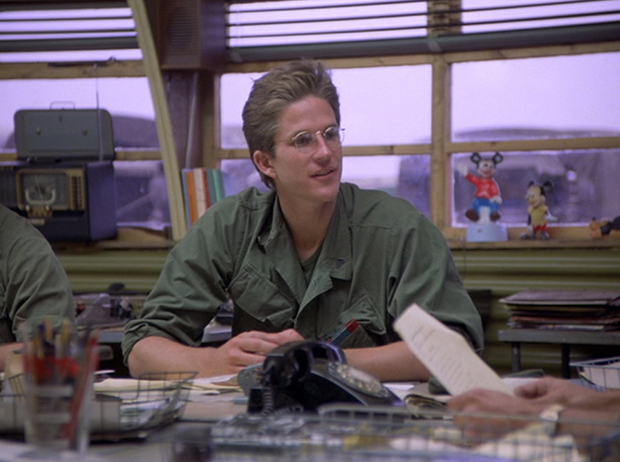
242 Lockhart as in 240. (50:56)
LOCKHART: The kill, Joker. The kill. I mean, all that fire, the grunts must have hit something.
243 CU of Joker. (50:58)
JOKER: Didn't see them.
244 Lockhart as in 242. (51:00)
JOKER:
Joker, I've told you, we run two basic stories here. Grunts who give half their pay to buy gooks toothbrushes and deodorants, winning of hearts and minds. Okay? And combat action that results in a kill, winning the war. Now, you must have seen blood trails. Drag marks?
245 Joker as in 243. (51:17)
JOKER:
It was raining, sir.
246 Lockhart as in 244. (51:19)
LOCKHART:
Well, that's why God passed the law of probability. Now rewrite it and give it a happy ending. Say, one killed.
Make it a sapper or an officer. Which?
247 Joker as in 245. (51:27)
JOKER:
Whichever you say.
248 Lockhart as in 236. (51:29)
LOCKHART:
Grunts like reading about dead officers.
249 Joker as in shot 239. (51:32)
JOKER: Okay, an officer. How about a general?
Everyone laughs.
250 Lockhart as in shot 248. (51:32)
LOCKHART: Joker, maybe you'd like our guys to read the paper and feel bad. I mean, in case you didn't know it, this is not a particularly popular war.
Now, it is our job to report the news that these, uh, why-are-we-here civilian newsmen ignore.
251 Joker as in shot 247. (51:48)
JOKER: Sir, maybe you should go out on some ops yourself. I'm sure you could find a lot more blood trails and drag marks.
252 Lockhart as in shot 250. (51:48)
LOCKHART:
Joker, I've had my ass in the grass. Can't say I liked it much. Lots of bugs and too dangerous. As it happens, my present duties keep me where I belong, in the rear with the gear.
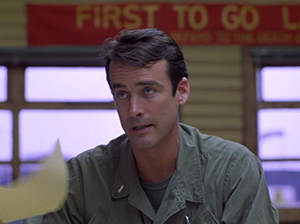 229 |
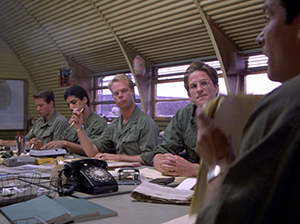 230 |
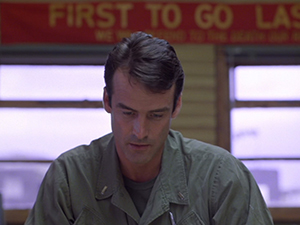 231 |
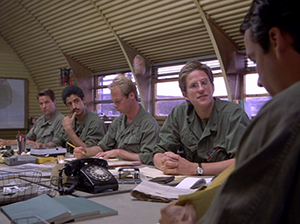 232 |
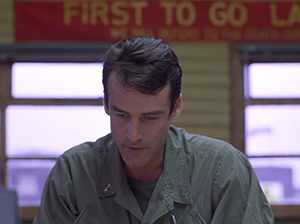 233 |
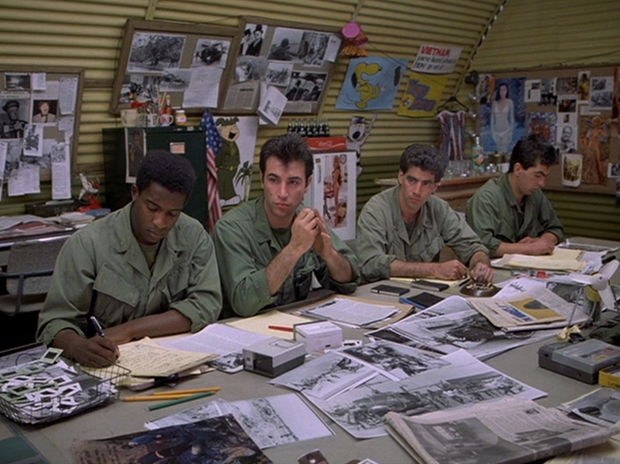 234 |
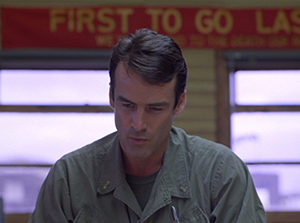 235 |
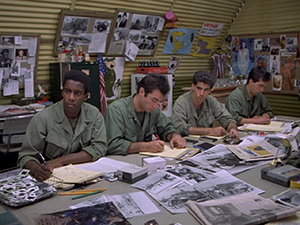 236 |
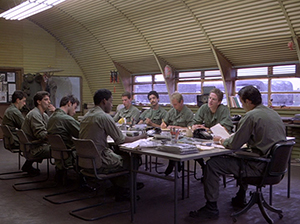 237 |
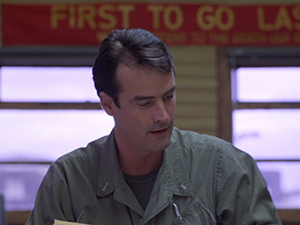 238 |
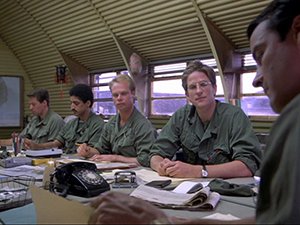 239 |
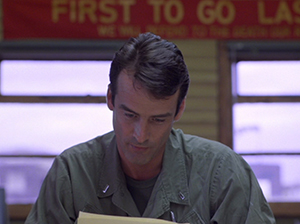 240 |
 241 |
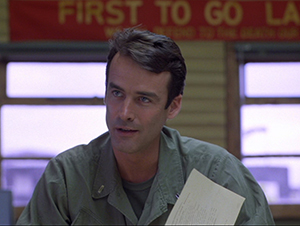 242 |
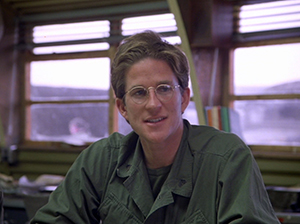 243 |
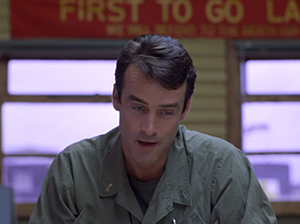 244 |
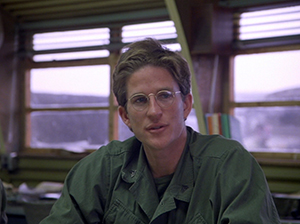 245 |
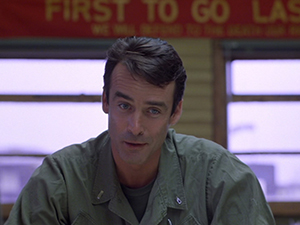 246 |
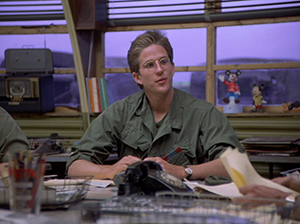 247 |
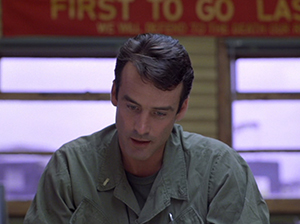 248 |
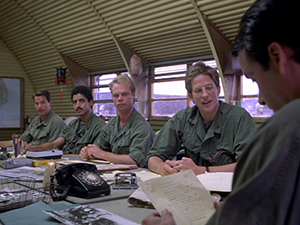 249 |
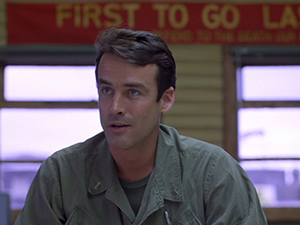 250 |
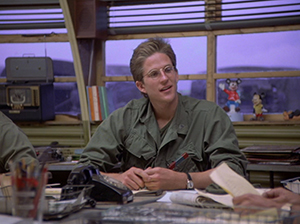 251 |
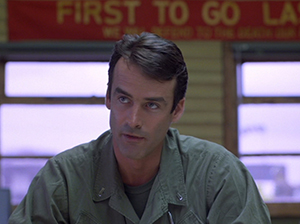 252 |
This Stars and Stripes meeting is not in the book. Instead it seems to be replacing a meeting with Captain January who is playing Monopoly with Mr. Payback when Joker inquires why his piece on a howitzer crew wasting a squad of NVA with a beehive round was killed. Joker says, "In Da Nang some poges told me that a colonel shit-canned my story. Some colonel said that beehive rounds were a figment of my imagination because the Geneva Convention classified them as 'inhumane' and American fighting men are incapable of being inhumane."
At this meeting, Joker is given the news he's been promoted to sergeant, a responsibility he does not want, he doesn't want to rise in rank. "No, sir. We bomb these people, then we photograph them. My stories are paper bullets fired into the fat black heart of Communism. I've fought to make the world safe for hypocrisy. We have met the enemy and he is us. War is good business--invest your son. Viet Nam means never having to say you're sorry. Arbeit Macht Frei--. I'm a corporal. You can send me to the brig, sir--I know that. Lock me up in Portsmouth Naval Prison until I rot, but let me rot as a corporal, sir. You know I do my job. I write that the Nam is an Asian Eldorado populated by a cute, primitive but determined people. War is a noisy breakfast food. War is fun to eat. War can give you better checkups. War cures cancer--permanently. I don't kill. I write. Grunts kill; I only watch. I'm only young Dr. Goebbels. I'm not a sergeant."
Captain January's opinion of the job of war correspondants is, "If we had Marine generals who understood business this war would be over. The secret to winning this war is in public relations. Harry S. Truman once said that the Marine Corps has a propaganda machine almost equal to Stalin's. He was right. In war, truth is the first casualty. Correspondents are more effective than grunts. Grunts merely kill the enemy. All that matters is what we write, what we photograph. History may be written with blood and iron but it's printed with ink. Grunts are good show business but we make them what they are. The lesser services like to joke about how every Marine platoon goes into battle accompanied by a platoon of Marine Corps photographers. That's affirmative. Marines fight harder because Marines have bigger legends to live up to."
Some of the same function of that episode in the book is reproduced through the cynicism of this scene in the film, Lockhart reminding Joker what their war correspondance is for, which is"winning hearts and minds", stories of "winning the war", reporting kills.
Some people think Kubrick's representation of women in film is reprehensible, such as in Full Metal Jacket, in which we have thus far an encounter with a prostitute and now a request for shots up Ann Margaret's skirt. Consider instead that Kubrick is interested in showcasing here patriarchal systemic attitudes toward women that are abusive and devaluing. They were nowhere in the boot camp except for the D.I. labeling the girlfriend back home as a Mary Jane Rottencrotch, and bonding the Marine instead to the rifle which he had to give a female name. He was even told he was wedded to it, going to bed with it at night. Now, in Vietnam, Kubrick has the first encounter be with a Vietnamese prostitute who is dressed in what is equivalent (defining it as such due the cowboy and Indian theme films later) to an American Indian loincloth. Rather than a woman as a person, she is a sex object, just as Ann Margaret becomes only a sex object. I address the subject or representation of women in the film in Part Six. I wil note here that I've read, for the most part, it was the economics of war that drove women into the trade through fighting and bombing forcing their migration to the cities, or the Strategic Hamlet Program. Many would be in the position of supporting families of several generations, while also ostracized from society for their work. Moving to the city from the country, they were uneducated and unable to find other work. Kubrick doesn't give the back story. He rarely gives back stories. He shows a situation. And, actually, I have read a number of different stories on prostitution under French colonialism, during the Vietnam War, and its aftermath, and they can vary dramatically from account to account on causation and results. For instance, another source interviewed Vietnamese women, transplants to the United States, who represented village life as horrible and that prostitution in the big city was their escape from that drudgery and arranged marriage, but the women in that article were also all given as describing dysfunctional families from which they were eager to extricate themselves. It stands to reason that women of a variety of backgrounds, with different stories, would find themselves earning their living as prostitutes. Rather than supplying back story, Kubrick just presents the woman selling herself, the dynamics of the situation, the language as it relates to sex, building upon the earlier dissociation in Boot Camp from the female as a rottencrotch entity outside their brotherhood--exempting the spousal gun that has been given a female name.
In Paths of Glory, the story cultivates with the audience a great sympathy for the soldiers in the trenches, their lives wasted by the elite. Then, at the end, we are shown a bar in which the soldiers are enjoying a moment of respite from the war, and are giving the sole woman in the establishment a hard time. She is unnerved, intimidated. They don't care. As I write in The Real Horror of The Shining, the Misogyny of the Audience for Wendy Torrance:
We are with them [the soldiers]. One of them. Now, however, in the cafe, when they are promised an exhibit of the newest acquisition of "the enemy", and onto the stage is pushed-pulled a woman (who is "the enemy"), the various faces of their raucous reception is meditated upon with some disdain and resignation by Kirk Douglas, his reaction signalling us that this is not right, that we must now be at odds with the men with whom we had sympathized, that we should take Douglas' cue and separate ourselves from their laughter as the cafe owner points out to the soldiers that the frightened woman has "absolutely no talent at all except for maybe a little natural talent", he echoing her figure's curves with his hand. She can't dance, she can't tell jokes, she can't balance rubber balls on her nose. But when she begins to sing, tears streaming down her face, "The Faithful Hussar", the men are silenced and cry along.
Shelley Duvall's Wendy, for many in the audience, is "the enemy" without their being at all cognizant of the fact. To understand the how and why is to examine one of the trickier aspects of the film in its exposure of the hatred of too many for her--the female, a victim, a survivor, and the enemy. Unlike Paths of Glory we don't have a Kirk Douglas letting the audience know when their response betrays hostile sexism and contempt for her vulnerability, not as even a feminine trait but vulnerability in general, even their own. Whereas the soldiers respond to the German woman's tearful song of love and loss, the audience ofis not scripted. How will they respond to Wendy when left to their own devices?
In Full Metal Jacket, Lockhart wants crotch shots of Ann Margaret and if there are any who find this sexist it's not in their job description to be able to protest. You do as you're told. If one doesn't want to be a party to it, the best one can do is accidentally arrange not to get such shots. Joker is the conscience of the film and supplies sometimes a guide for the audience to follow, but he's also working shit out for himself, faced with terrible complexities that tear one apart on how to feel, and having himself been through boot camp. The best he can come up with is to acknowledge on his helmet one is born to kill, but that he believes in pursuing peace, as evidenced with his peace button. One can be a vegan and if in a situation where flesh of some kind is the only option for sustenance, evolution has supplied humans with the biology to survive. The psychological difficulties over murder of other living things for sustenance has been with humans at least as long as spiritual/social practices that cleanse of that guilt.
Ann Margaret did have a Vietnam tour that was delayed by the Tet Offensive. Lockhart's comments on getting fur and early morning dew is offensive, but back in the late '70s, a Vietnam vet, who had done surveillance photography in the war, was working at a newspaper where my husband was also employed in the photo department (not a photographer, developing film etc.) and it was an uncomfortable experience for me to walk through the photo-journalism area as the photographer had plastered the walls of the small lounge with shots taken up cheerleader's skirts and up the skirts of victims of automobile accidents. He was the lead photographer and the area was his to rule as he saw fit and that's how he dressed it, a side table also piled high with Hustler magazines. There was another veteran there who had also done surveillance photography and he wasn't like that. I don't know. I'm not saying it had anything to do with the war. Just that this particular photojournalist plastered the walls with those photos. No women were employed in the department at that time and no women would have been considered for employment. That's just the way it was. Ugly. It's shocking to examine photos on a wall and realize they are all up-skirt pictures of teen girls at football games and dead women thrown out of cars.
From "Stars and Stripes", below, Ann Margaret in Chu Lai, in March 1966, Jack Baird © Stars and Stripes. The story that Ann Margaret gave in an interview I watched is that she got a signed petition from individuals in the service asking her to come over and perform, so she did. She would later perform with Bob Hope in 1968, but this was not a Bob Hope show. She stated that the helicopter she was in came under fire when she was flying into Phu Bai and service men surrounded her to protect her.

By the way, where Kenneth Russell may have gotten the idea to dip Ann Margaret in beans and chocolate, from the 1966 movie, The Swinger. Came across this while I was searching for Ann Margaret video in Vietnam, came on the Stars and Stripes photo and went with that instead. The below has nothing to do with Kubrick but I just need to include it.
Hartman is called Gerheim in the book, Lockhart is Lynch and Pratt is instead Lawrence, so these are all names that have been changed for the film.
Kubrick tends to choose stories that have characters revisiting terrain (or rework them so they're cyclical), such as with Alex in A Clockwork Orange, when he leaves the prison/hospital, he runs into people from his former life, and even accidentally finds his way HOME, and in Eyes Wide Shut, after his night at Somerton, Bill returns to places he'd visited beforehand in an attempt to figure out what is happening in his life. He also several times traverses streets that have been repurposed, have new signage, and the audience is given the opportunity to be aware these are the same streets he was on earlier, they've only been superficially changed. It's as if he's trapped in a maze of rooms that are much alike, and we're given the opportunity to wonder at how these scenes link together.
Joker's D.I. was Hartman, and in Da Nang he's under a man named Lockhart, so it's sensible to consider Kubrick is linking the two superiors, Hartman and Lockhart. I think the "Lock" part of the name likely refers back to the episode in which Hartman noticed Pyle's locker was unlocked (the lock was also on backwards) and opening the trunk to find what was missing came across the jelly doughnut. It was because of that doughnut that Joker was made responsible for Pyle, was made his bunkmate, and was elevated to squad leader. As I've noted, Joker was promoted to Sargent in the book, but it doesn't happen in the film. Lockhart will, however, give him the responsibility of taking care of Rafter Man.
Hart means deer and there is a deer observed in advertising for Bột Ngũ Vị Hương Hiệu Con Nai beneath the Las Vegas sign in the scene with the prostitute. This is Con Nai Five Spices Powder, the con nai being a Vietnamese spotted deer, the same genus as the Sika deer revered in Shintoism as spiritual beings that commune with Kami, a form of spirit, and are thus messengers of the gods and protected. I don't find a similar belief in Vietnam.
Pyle (Leonard Lawrence), with his crazed stare, is so associated with Jack in The Shining that I assume Kubrick's embedded a reference to Pyle when Lockhart relates, in shot 237, that the Lawrence Welk Show is coming out in two weeks. Or it may be purely coincidental.
Several things we see in the room: an image of Snoopy kicking a bomb instead of a football, an image of Charlie Brown in which he appears to be carrying a sword and wearing some type of military hat (Civil War?), Sergent Orville P. Snorkel is seen from the Beetle Bailey comic but we don't see Beetle Bailey, there's a photo of W. C. Fields and Edgar Bergen's ventriloquist dummy Charlie McCarthy. I would imagine Charlie Brown and Charlie McCarthy are intended to be word play concerning Charlie, used for Viet Cong (Victor Charlie), but sometimes used for American military as Charlie was just a phonetic alphabet word representing the letter C.
253 The base at night. A view of the gate and living quarters. Celebratory fireworks spark the sky. Begin music, "The Chapel of Love". (52:06)
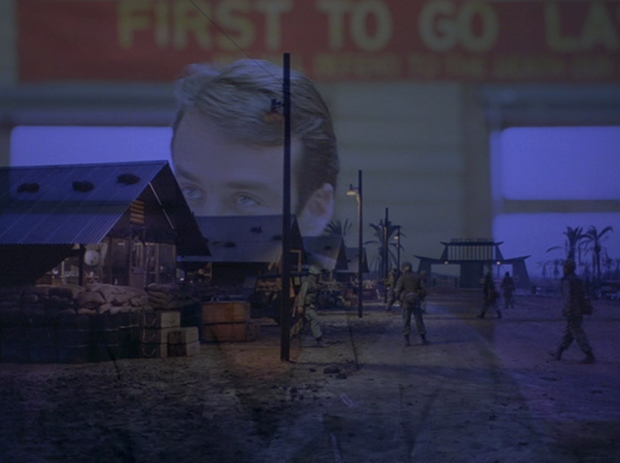
JOKER: Tet. The year of the monkey. Vietnamese Lunar New Year's Eve. Down in Dogpatch, the gooks are shooting off fireworks to celebrate.
254 Crossfade to interior of hut. MS of Joker in his bunk from beyond a shelf. (52:26)
JOKER (yawns): I am fucking bored to death, man. I gotta get back in the shit. I ain't heard a shot fired in anger in weeks.
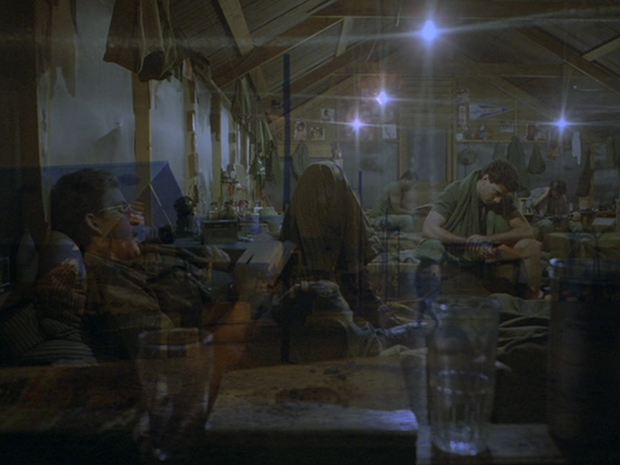
255 Opposing cots, Payback in the cot opposite Joker, and Rafter Man beyond. (52:43)

PAYBACK: Joker's so tough, he'd eat the boogers out of a dead man's nose .then ask for seconds.
The other Marines laugh.
256 Joker as in shot 255 but one of the drinking glasses is no longer observed that was in the foreground. (52:51)
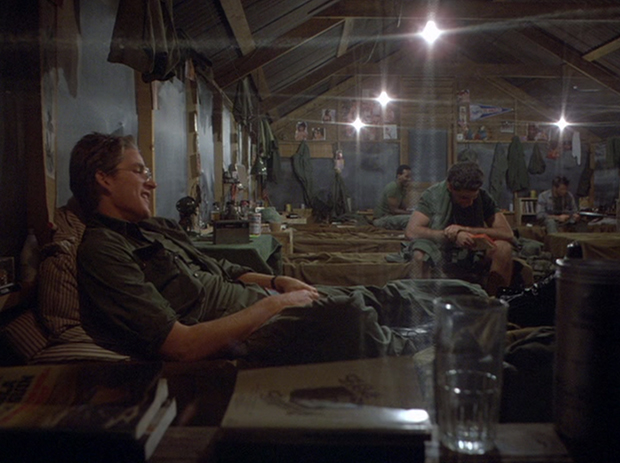
JOKER (imitating John Wayne): Listen up, pilgrim. A day without blood is like a day without sunshine.
257 View of Payback as in 255. (53:08)
PAYBACK: Shit. Joker thinks the bad bush is between an old mama-san's legs.
He's never been in the shit. It's hard to talk about it, man. It's like on Hastings.
CHILI: You weren't on Operation Hastings, Payback. You weren't even in country.
PAYBACK: Eat shit and die, you fucking Spanish-American. You fucking pogue. I was there, man. I was in the shit with the grunts.
258 Joker as in shot 256. (53:16)
JOKER (still mimicking John Wayne): Don't listen to any of Payback's bullshit, Rafter Man.
259 MS of Rafter Man reclining on his bunk. (53:23)
JOKER (off screen): Sometimes he thinks he's John Wayne.
PAYBACK (off screen):
You listen to Joker, new guy.
260 View of Payback as in 257. (53:28)
PAYBACK:
He knows ti ti. Very little. You know he's never been in the shit, 'cause ain't got the stare.
RAFTER MAN: The stare?
PAYBACK: The thousand-yard stare. A Marine gets it after he's been in the shit for too long. It's like--It's like you're really seeing beyond.
261 MCU of Rafter Man. (53:46)
PAYBACK (off screen): I got it. All field Marines got it. And you'll have it too.
RAFTER MAN (laughs): I will?
262 Shot of Joker's side of the room (53:51)
STORK: Hey, Payback, how do you stop five black dudes from raping a white chick?
263 Shot of Payback's side of the room as in 260. (53:55)
PAYBACK: Fuck you, Stork.
STORK (off screen): Throw them a basketball.
The others laugh. There's the sound of gunfire.
DAVE: Incoming
PAYBACK: Oh, shit.
264 Joker's side of the room. (The book that was on the shelf beside the glass is now gone.). (54:07)
CHILI: Them are outgoing.
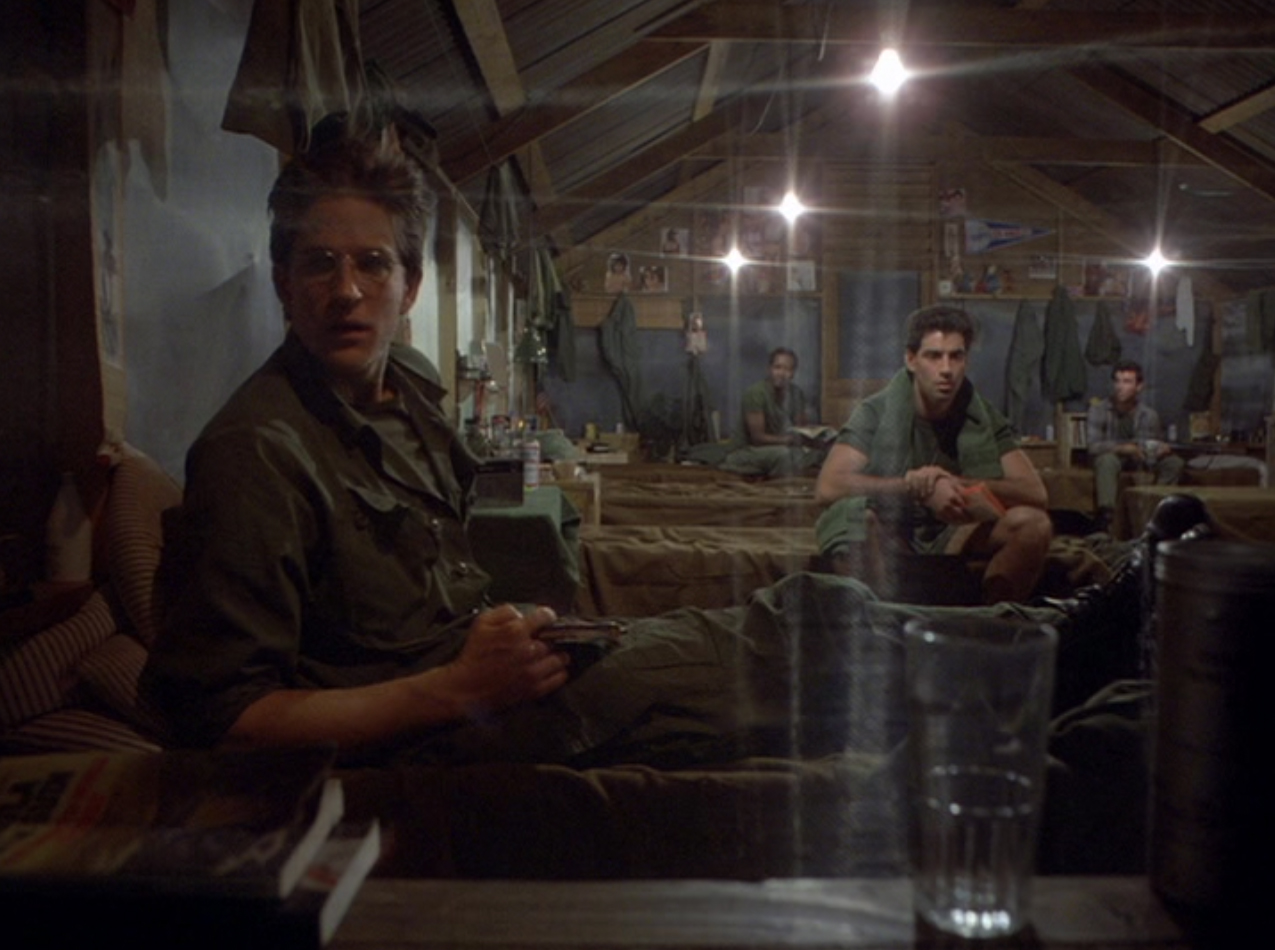
265 Payback's side of the room. The lights dim. (54:07)
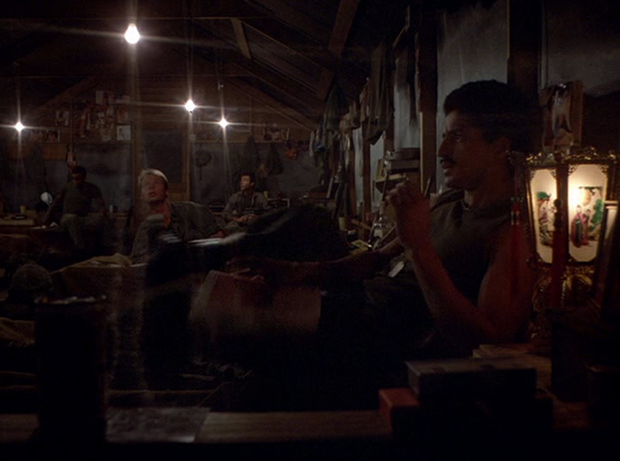
DAVE: That ain't outgoing.
CHILI: Them ain't outgoing.
Everyone's up on their feet and grabbing their gear to run out the door as the lights go out.
DAVE: Now, what did I just say?
End Chapel of Love music.
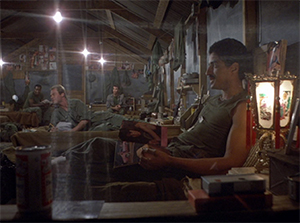 257 |
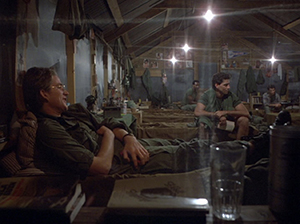 258 |
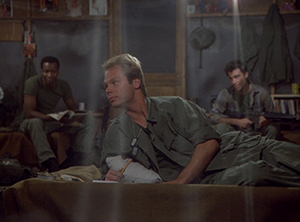 259 |
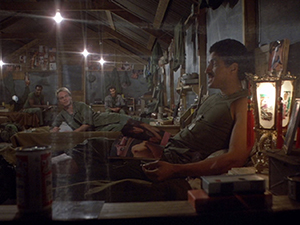 260 |
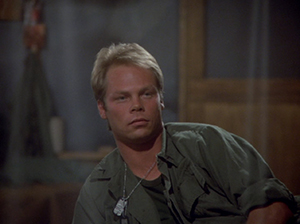 261 |
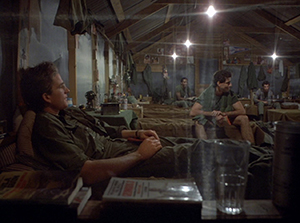 262 |
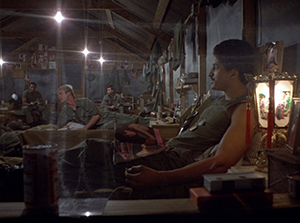 263 |
 264 |
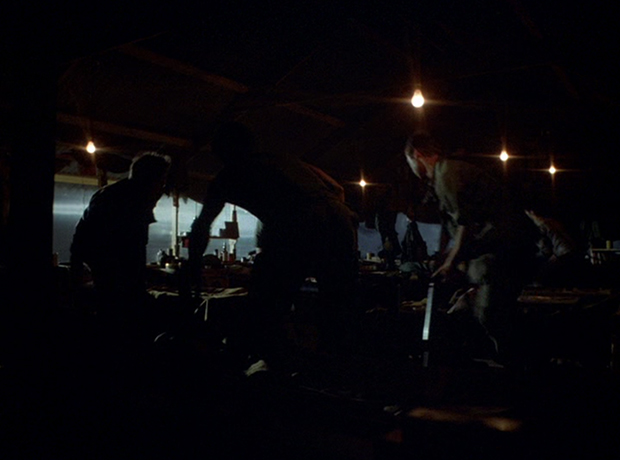 265 |
|
266 Tracking MLS down the road viewing Joker, Rafter Man and the other Marines as they run past the living quarters, sirens wailing. Fires burning in the background, they head to a trench protected by a cover of sandbags. (54:17)
267 MCU from Joker's left in the trench as he prepares his machine gun. (54:39)
268 View of the main gate from inside, fires burning outside it. (54:47)
269 MS of Joker and the others from the left, a fire burning beyond the trench (54:49)
JOKER:
Hey, I hope they're just fucking with us. I ain't ready for this shit.
MARINE: Amen.
270 The gate as in shot 268. Trucks are viewed approaching outside. (54:57)
271 Joker as in shot 269. (55:03)
272 View of the gate as in shot 270. As a truck crashes through, Joker fires his machine gun. The truck blows up. (Joker is not specifically shown firing, but it would seem to be him.) (55:06)
273 Joker as in shot 271 firing. (55:13)
274 View of the gate as in shot 272. Machine gun fire continues as men run through the gate, some shot down. (55:15)
275 Joker as in shot 273. (54:21)
276 LS of silhouettes of men outside the front gate running toward it. (55:24)
277 MS of Viet Cong entering the gate and being shot down. (55:28)
278 CU from the left of Payback, Rafter Man next to him. (55:32)
279 LS view of the front gate from beyond the trench, more Viet Cong running in and being shot down. (55:34)
280 Joker as in shot 275. (55:38)
Joker stops firing.
281 View of the gate. We hear one of the Viet Cong yell something. (55:47)
Joker stops firing and we hear perhaps one of the Viet Cong yell something. The assault appears to have ended. Men yell out, "Cease fire!"
282 Joker as in shot 280. The assault appears to have ended. Men yell out, "Cease fire!" (55:51)
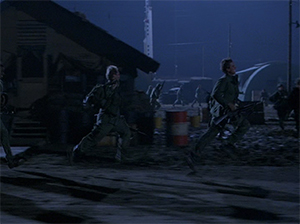 266 |
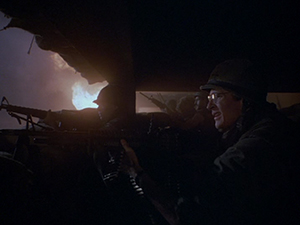 267 |
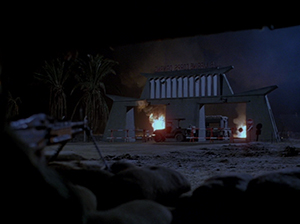 268 |
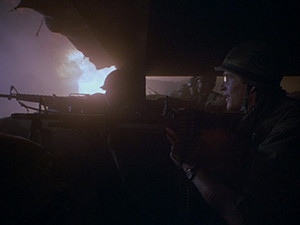 269 |
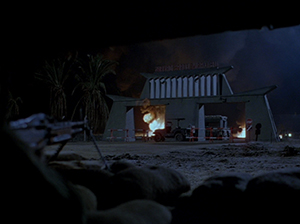 270 |
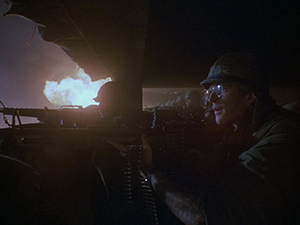 271 |
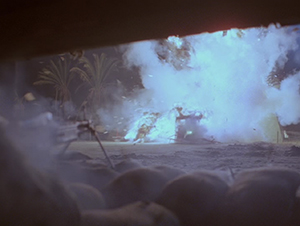 272 |
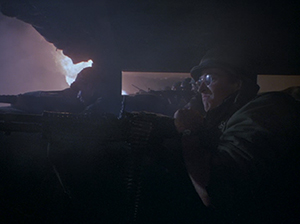 273 |
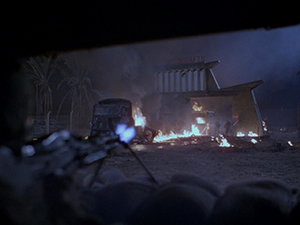 274 |
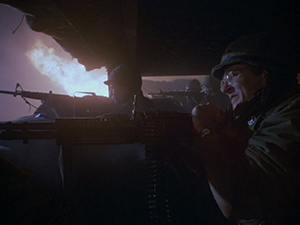 275 |
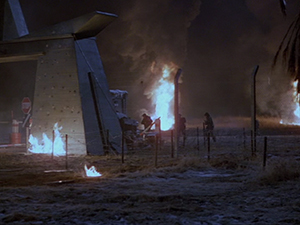 276 |
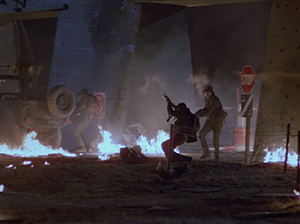 277 |
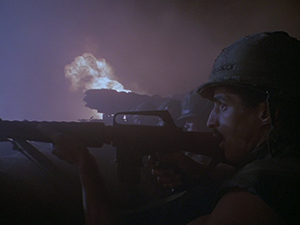 278 |
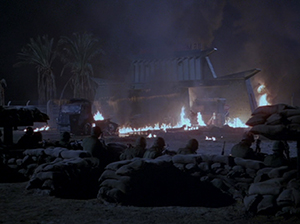 279 |
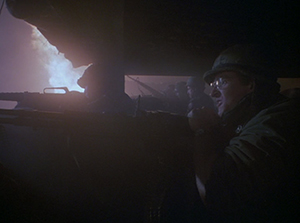 280 |
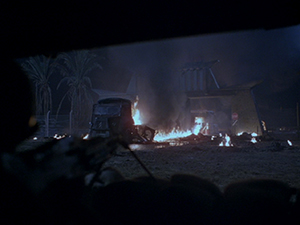 281 |
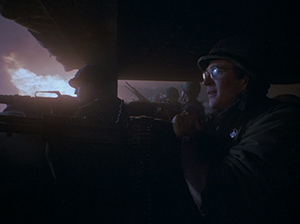 282 |
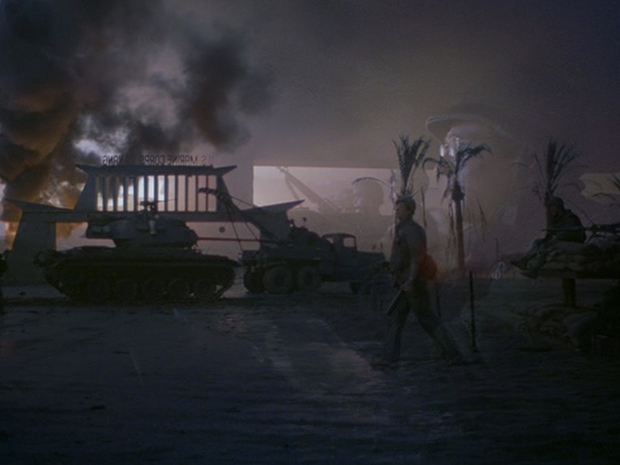 283 |
The lighting for the barracks scene is beautiful, the glare off the bare bulbs filling the hut with luminous veils, contributing a sense of immediacy, of intimacy with the environment, that stands in stark contrast to the antiseptic, bright barracks of boot camp. That the light occupies the screen with such strength of character makes all the more dramatic when it dims then goes out with the onset of battle.
Tet, the Lunar New Year, is a spring festival. "The Chapel of Love" speaks of it being spring and being married in the chapel of love, which is appropriate for this section in which we see the Marines in battle, relying on their rifles, who Hartman had taught Joker was his spouse.
Goin' to the chapel and we're gonna get married
Goin' to the chapel and we're gonna get married
Gee, I really love you
And we're gonna get married
Goin' to the chapel of love
Spring is here, the sky is blue, whoa-oh-oh
Birds all sing as if they knew
Today's the day we'll say "I do"
And we'll never be lonely anymore
Because we're goin' to the chapel and we're gonna get married
Goin' to the chapel and we're gonna get married
Gee, I really love you
And we're gonna get married
Goin' to the chapel of love
Bells will ring, the sun will shine, whoa-oh-oh
I'll be his and he'll be mine
We'll love until the end of time
And we'll never be lonely anymore because
Because we're goin' to the chapel and we're gonna get married
Goin' to the chapel and we're gonna get married
Gee, I really love you
And we're gonna get married
Goin' to the chapel of love yeah, yeah, yeah, yeah
Goin' to the chapel of love yeah, yeah, yeah, yeah
Not much time is invested in introducing us to Joker's fellow war correspondants, and the more negative aspects have been eliminated, such as the novel there's mistreatment of a child in an effort to get good "winning hearts and minds" shots. Kubrick concentrates on the sense of rivalry between those who have and haven't been in battle, between the new guys and those who are experienced, as well as racial tensions.
For the moment, the environment may remind a little of MASH, which ran forever on television throughout my school years and which, though we knew it was supposed to be about the Korean War, individuals of my generation comprehended as being about Vietnam, but that America wasn't ready for a television show about Vietnam.
The vying over who has experience and who doesn't, which somehow swerves into a racist joke, ends when Joker's forecast of the breaking of the holiday cease-fire, which Lockhart had dismissed, proves true. In the book, however nightmarish throughout, we learn a little about life at the base, such as about food, how Joker teaches Rafter Man to camouflage himself like an Army soldier so they can use their mess hall and at least take some pleasure in Army food, far better than what is given the Marines. We learn something about Vietnamese who the men pay to do chores for them. About how they entertain themselves. But Gustav as well spends little time on this, for The Short-timers, after boot camp, almost immediately immerses us in the Tet Offensive, which many watching the film won't even know about, and may not have known even when the film came out what the Tet Offensive was.
After chow we play tag back to our hootch. Laughing and breathing hard, we take a moment to pull down the green plastic ponchos nailed on the outside of the hootch. During the night the ponchos will keep light in and rain out.
We lie on our racks and swap scuttlebutt. On the ceiling, the combat correspondent's motto in six-inch block letters: FIRST TO GO, LAST TO KNOW, WE WILL DEFEND TO THE DEATH OUR RIGHT TO BE MISINFORMED.
Mr. Payback performs his sea stories for Rafter Man: "The only difference between a sea story and a fairy tale is that a fairy tale begins with 'Once upon a time...' and a sea story begins with 'This is no shit.' Well, New Guy, listen up, because this is no shit. January orders me to play Monopoly. All fucking day. Every day of the fucking week. There's nothing lower than a lifer. They fuck me over, man, but I don't say a word. I do not say a word. Payback is a motherfucker, New Guy. Remember that. When Luke the gook zaps you in the back and Phantoms bury him in napalm canisters, that's payback. When you shit on people it comes back to you, sooner or later, only worse. My whole program is a mess because of lifers. But Payback will come, sooner or later. I'd walk a mile for a payback."
I laugh. "Payback, you hate lifers because you are a lifer."
Mr. Payback lights up a joint. "You're the one who's tight with the lifers, Joker. Lifers take care of their own."
"Negative. The lifers are afraid to talk to me, I got so many ops."
"Operations? Shit." Mr. Payback turns to Rafter Man. "Joker thinks that the bad bush is down the road in the ville. He's never been in the shit. It's hard to talk about it. Like on Hastings--"
Chili Vendor interrupts: "You weren't on Operation Hastings, Payback. You weren't even in country."
"Oh, eat shit and die, you fucking Spanish American. You poge. I was there, man. I was in the shit with the grunts, man. Those guys have got guts, you know? They are very hard individuals. When you've been in the shit with grunts you're tight with them from then on, you know?"
I grunt. "Sea stories."
"Oh, yeah? How long have you been in country, Joker? Huh? How much T.I. you got? How much fucking time in? Thirty months, poge. I got thirty months in country. I been there, man."
I say, "Don't listen to any of Mr. Payback's bullshit, Rafter Man. Sometimes he thinks he's John Wayne."
"That's affirmative," says Mr. Payback. "You listen to Joker, New Guy. He knows ti ti--very little. And if he ever does know anything it'll be because he learned it from me. You just know he's never been in the shit. He ain't got the stare."
Rafter Man looks up. "The what?"
"The thousand-yard stare. A Marine gets it after he's been in the shit for too long. It's like you've really seen...beyond. I got it. All field Marines got it. You'll have it, too."
Rafter Man says, "I will?"
Mr. Payback takes a few hits off the joint and then passes it to Chili Vendor. "I used to be an atheist, when I was a New Guy, a long time ago..." Mr. Payback takes his Zippo lighter out of his shirt pocket and hands it to Rafter Man. "See? It says, 'You and me, God--right?'" Mr. Payback giggles. He seems to be trying to focus his vision on some distant object. "Yes, nobody is an atheist in a foxhole. You'll be praying."
Rafter Man looks at me, grins, hands the lighter back to Mr. Payback. "There sure is a lot of stuff to learn."
I'm whittling a piece of ammo crate with my K-bar jungle knife. I'm carving myself a wooden bayonet.
Daytona Dave says, "Remember that gook kid that tried to eat the candy bar? It bit me. I was down in the ville, scarfing up some orphans and that little Victor Charlie ambushed me. Ran up and bit the shit out of my hand." Daytona holds up his left hand, revealing a little red crescent of tooth marks. "The kids says that our chop-chop is number ten. I bet I get rabies."
Chili Vendor grins. He turns to Rafter Man. "There it is, New Guy. You'll know you're salty when you stop throwing C-ration cans to the kids and start throwing the cans at them."
I say, "I got to get back into the shit. I ain't heard a shot fired in anger in weeks. I'm bored to death. How are we ever going to get used to being back in the World? I mean, a day without blood is like a day without sunshine."
Chili Vendor says, "No sweat. The old mamasan that does our laundry tells us things even the lifers in Intelligence don't know. She says that in Hue the whole fucking North Vietnamese army is dug in deep inside an old fortress they call the Citadel. You won't come back, Joker. Victor Charlie is gonna shoot you in the heart. The Crotch will ship your scrawny little ass home in a three-hundred-dollar aluminum box all dressed up like a lifer in a blouse from a set of dress blues. But no white hat. And no pants. They don't give you any pants. Your friends from school and all of the relatives you never liked anyway will be at your funeral and they'll call you a good little Christian and they'll say you were a hero to get wasted defeating Communism and you'll just lie there with a cold ass, dead as a mackerel."
Daytona Dave sits up. "You can be a hero for a little while, sometimes, if you can stop thinking about your own ass long enough, if you give a shit. But civilians don't know what to do, so they put up statues in the park for pigeons to drop turds on. Civilians don't know. Civilians don't want to know."
I say, "You guys are bitter. Don't you love the American way of life?"
Chili Vendor shakes his head. "No Victor Charlie ever raped my sister. Ho Chi Minh never bombed Pearl Harbor. We're prisoners here. We're prisoners of the war. They've taken away our freedom and they've given it to the gooks, but the gooks don't want it. They'd rather be alive than free." [Rephrased and given to Eightball for the film interview.]
I grunt. "There it is."
The novel has the Tet Offensive commence, instead, while Joker and Rafter Man are on the roof watching fireworks.
Midnight. Down in Dogpatch, in the ville, the gooks are shooting off fireworks to celebrate the Vietnamese New Year. Rafter Man and I sit on the tin roof of our hootch so that we can watch the more impressive fireworks on the Da Nang airfield. One hundred-and-twenty-two-millimeter rockets are falling from the dark sky. I open a B-3 unit and we eat John Wayne cookies, dipping them in pineapple jam.
Chewing. Rafter Man says, "I thought this was supposed to be a truce on account of Tet is their big holiday."
I shrug. "Well, I guess it's hard not to shoot somebody you've been trying to shoot for a long time just because it's a holiday."
A sudden swooosssh...
Incoming.
I jump off the roof.
Rafter Man stands up, his mouth open. He looks down at me like I'm crazy. "What--"
A rocket hits the deck fifty yards away.
Rafter Man falls off the roof.
I jerk Rafter Man to his feet. I shove him. He falls into a sandbagged bunker.
All around the hill orange machine-gun tracers flash up into the sky. Outgoing mortars. Outgoing artillery. Incoming rockets. All kinds of noise. Illumination rounds pop high above the rice paddies. The flares sway down, glowing, suspended beneath little parachutes.
I listen for a few moments and then I grab Rafter Man and I pull him into our hootch. "Get your piece."
I pick up my M-16. I snap in a magazine. I throw a bandolier of full magazines to Rafter Man. "Lock and load, recruit. Lock and load."
"But that's against regulations."
"Do it."
Outside, headquarters personnel from the surrounding hootches are stumbling into rifle pits on the perimeter. They crouch down in the damp holes in their skivvies. They stare out through the wire.
Down on the airfield in Da Nang Victor Charlie's rockets are raining down on the concrete corrals where the Marine Air Wing parks its F-4 Phantom fighter bombers. The rockets blink like flashbulbs. The flashbulbs pop. And then the sound of drums.
From U.S. Marines in Vietnam, The Defining Year, 1968:
By the time of Tet, Operation Checkers had ended and at Da Nang the situation was precarious. With the departure of the 5th Marines, there was only one Marine infantry regimental headquarters in the extensive Da Nang tactical area of operations. Colonel Ross R. Miner's 7th Marines with all three of its battalions had the responsibility for the northern, western, and southwestern sectors. The 2nd Battalion was in the north, the 1st Battalion was in the center, and the 3rd Battalion was in the sough. With the departure of the 2nd Battalion, 5th Marines in mid-January for Phu Bai, the 3rd Battalion, 7th Marines extended its area of operations to include Anhoa to the south. Colonel Miner attached to additional companies to the 3d Battalion--Company I, 3d Battalion, 5th Marines and Company H, 2d Battalion, 7th Marines--to cover its extended area.
A conglomeration of Marine support units, ARVN, Korean Marines, and two Marine infantry battalions attempted to secure the remaining area.
......
For some time, the American forces had been aware that the enemy was about to launch some type of major offensive. General Westmoreland was convinced that this big push would come either just before or right after Tet--but not during the holidays and probably at Khe Sanh and in the DMZ section. At Da Nang, III MAF knew that the Communists were on the move. ......
...the Marine command learned of other ominous measures taken by the Communist forces in the Da Nang sector...Additional intelligence tended to confirm the enemy was about to initiate something big...Finally, according to Marine intelligence officers, another "very reliable source" flatly stated that the time of attack throughout MR (Military Region) 5 would be "at 0130 and no later than 0200 on 30 January."
By evening on the 29th, the 1st Marine Division at Da Nang was on a 100-percent alert.
Joker was right, with his news from intelligence, that something big was about to happen. Lockhart was wrong. And, as penance for being right, and a little flip about it, Joker is about to be sent to Phu Bai with Rafter Man.
283 Crossfade to the front gate as day dawns. The area is being cleaned up. Fires still burn and smoke bellows. Joker walks to screen left, Rafter Man following. Payback, at the rear, limps. Several prisoners bound by neck chains are led screen left to screen right. (56:06)
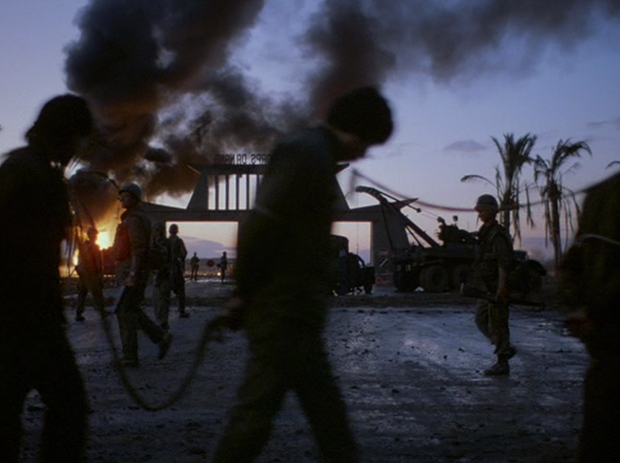
LOCKHART (off screen): The enemy has very deceitfully taken advantage of the Tet ceasefire to launch an offensive all over the country. So far, we've had it pretty easy here. But we seem to be the exception.
284 The journalists in their hut, dressed in flak gear. Lockhart, standing, walks around the table as he speaks, the rest seated, drinking from coffee cups, occasionally exclaiming dismay. (56:26)

LOCKHART: Charlie has hit every major military target in Vietnam and hit them hard. In Saigon the United States Embassy has been overrun by suicide squads. Khe Sanh is standing by to be overrun. We also have reports that a division of NVA has occupied all of the city of Hue south of the Perfume River. In strategic terms, Charlie's cut the country in half, the civilian press are about to wet their pants, and we've heard even Cronkite's gonna say the war is now unwinnable. In other words, it's a huge shit sandwich and we're all gonna have to take a bite.
285 MS of Joker and Rafter Man from across the table that is piled with ammo. (57:10)
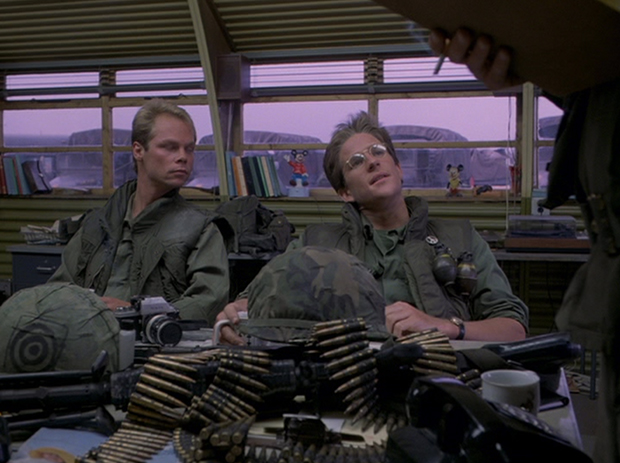
JOKER: Sir. Does this mean that Ann-Margret's not coming?
286 CU of Lockhart from below left, unamused. (57:15)
The journalists laugh.
LOCKHART: Joker, I want you to get straight up to Phú Bai. Captain January will need all his people.
287 MCU of Joker. (57:26)
JOKER: Yes, sir.
LOCKHART (off screen): And, Joker, you will take off that damn button. How's it gonna look if you get killed wearing a peace symbol?
288 MLS down the table of Rafter Man, Joker and Lockhart. (57:36)
RAFTER MAN:
Sir, permission to go with Joker?
LOCKHART: Permission granted.
RAFTER MAN: Thank you, sir.
JOKER:
Sir, permission not to take Rafter Man with me?
LOCKHART:
You still here? Vanish, Joker, most ricky-tick, and take Rafter Man with you. You're responsible for him.
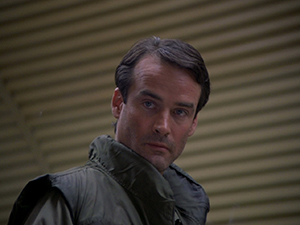 286 |
 287 |
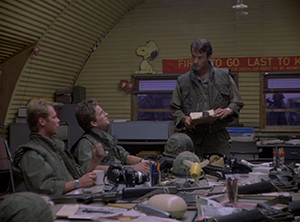 288 |
|
I believe we can think of Lockhart sending Joker to Phu Bai, with the responsibility for Rafter Man, as the equivalent of the interview sections in A Clockwork Orange and The Shining. Alex is eager to get out of prison so going through the Ludovico treatment sounds like a good deal to him, despite the fact he'll lose freedom to act by choice. During his interview, Jack is told how a former caretaker slaughtered his family, but he feels at home at the Overlook and is eager to move up there. Those situations are so different from Joker's that it might seem difficult to find parallels--but it's not a matter of exact correspondences. Joker has irked Lockhart, and so Lockhart decides to give Joker what he knows he wants, which is to be sent out to the "shit" and reconnect with Cowboy. Why Gustav's Joker would want to go out into the "shit", though he hates the war, is complex, but as correspondant it was also important to get out where the action was in order to be able to cover it firsthand, and not be a pogue taking it easy in the background. Lockhart is a door to what will be soul-shattering, redefining events for Joker, and he cooly sends him off--you can see that he wants Joker to have his ass kicked, making it clear that Joker could end up dead, so take off that peace button. He not only sends him off, but he burdens him with Rafter Man, but only because Rafter Man pesters, he wants not to be pestered, and he knows Joker doesn't want Rafter Man with him because Joker doesn't want the responsibility for another person's life.
Lockhart doesn't mind taking responsibility for another person's life, sending them out to possibly die.
From the book:
The Informational Services Office on the hill is a carnival with green performers--many, many of them. The lifers are all being fearless leaders. The New Guys are about to wet their pants. Everyone is talking. Everyone is pacing and looking, pacing and looking. Most of these guys have never been in the shit. Violence doesn't excite them the way it excites me because they don't understand it the way I do. They're afraid. Death is not yet their friend. So they don't know what they're supposed to say. They don't know what they're expected to do.
Major Lynch, our commanding officer, marches in and squares us away. He tells us that Victor Charlie has used the Tet holiday to launch an offensive all over Viet Nam. Every major military target in Viet Nam has been hit. In Saigon, the United States Embassy has been overrun by suicide squads. Khe Sanh is standing by to be overrun, a second Dien Bien Phu. The term "secure area" no longer has any meaning. Only fifty yards up the hill, near the commanding general's private quarters, a Viet Cong sapper squad has blown apart a communications center with a satchel charge. Our "defeated" enemy is lashing out with a power that is shocking.
Everybody starts talking at once.
Major Lynch is calm. He stands in the center of chaos and tries to give us orders. Nobody listens. He makes us listen. His words snap out like bullets from a machine gun. "Zip up those flak jackets. Put on that helmet, Marine. Load your weapons but do not put a round in the chamber. Everybody will shut the fuck up. Joker!"
"Aye-aye, sir."
Major Lynch stands in front of the Marine Corps flag--blood red, with an eagle, globe, and anchor of gold, U.S.M.C. and Semper Fidelis. He taps my chest with his finger. "Joker, you will take off that damned button. How is it going to look if you get killed wearing a peace symbol?"
"Aye-aye, sir!"
"Get up to Phu Bai. Captain January will need all his people."
Rafter Man steps forward. "Sir? Could I go with Joker?"
"What? Sound off."
"I'm Compton, sir. Lance Corporal Compton. From Photo. I want to get into the shit."
"Permission granted. And welcome aboard." The major turns, starts yelling at the New Guys.
I say, "Sir, I don't think that--"
Major Lynch turns back to me, irritated. "You still here? Vanish, Joker, most ricky-tick. And take the New Guy with you. You're responsible for him." The major turns and starts snapping out orders for the defense of the First Marine Division's Informational Services Office.
There are two Mickey Mouse figurines (one, I believe, may be a night light, a wire hanging down from it) in the window behind Joker. These are no longer observed in shot 287. It may have something to do with Lockhart's ordering Joker to Phu Bai, saying, "You still here? Vanish, Joker, most ricky-tick, and take Rafter Man with you."
The term, meaning, quick, is popular Marine Corps slang and comes from Rudyard Kipling's story of Rikki Ticky Tavi. Rikki is a mongoose who, as the pet of an English family in India, is protective of them. Nag, a male Cobra, and its spouse, Nagaina, want to get rid of the English family who have occupied their territory. When Nag hides in the bathroom, waiting to kill them, Ricki finds him and pins him down, giving the father of the human family the opportunity to shoot the snake. Nagaina, seeking revenge, threatens the human family's child at breakfast. Rikki races to the cobra's nest and destroys all her eggs but one. Returning, he distracts her from the child with that lone, remaining egg, her desire to protect it. Nagaina escapes with her egg but is chased by Rikki to her nest where he kills her.
289 Aerial shot of mist over Vietnam tree canopy from helicopter, the helicopter's shadow observed. (57:59)
290 Shot of helicopter passing before the sun. (58:04)
291 Aerial shot of flying through the mist over Vietnam tree canopy. (58:10)
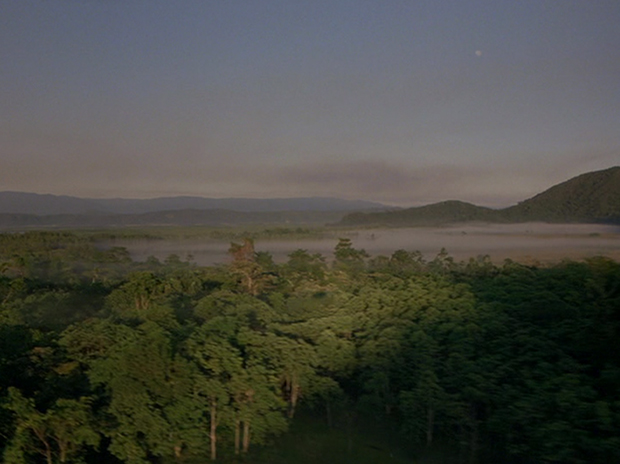 289 |
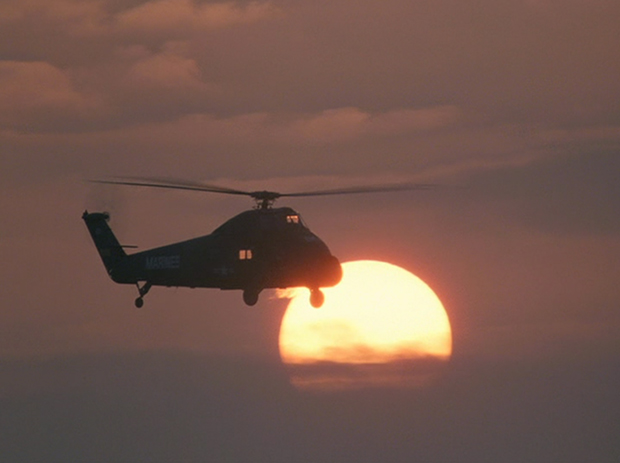 290 |
 291 |
|
292 MCU of Rafter Man in the helicopter, battling nausea. Sounds of gunfire. (58:20)
HELICOPTER GUNNER (off screen): Get some. Get some.
293 MS of helicopter funner from behind Rafter Man and Joker as he shoots into the rice fields. (58:31)
HELICOPTER GUNNER): Get some. Get some. Yeah. Yeah.
294 Rafter Man as in 292. (58:36)
HELICOPTER GUNNER (off screen): Get some. Get some. Come on. Come on.
295 MCU of Joker observing Rafter Man's nausea.. (58:44)
HELICOPTER GUNNER (off screen): Get some.
296 MS of helicopter gunner. (58:51)
HELICOPTER GUNNER: Ha-ha! Get some, baby. Get some. Get some. Get some.
297 People running in the fields. They pass over a bridge. (59:01)
HELICOPTER GUNNER (off screen): Get some. Get some, come on. Get it, come on. Get some. Get some. Yeah, yeah, yeah.
298 Helicopter gunner as in 296. (59:08)
HELICOPTER GUNNER: I've got you, mother. Ha-ha! Anyone...
299 MS of Joker and Rafter Man. Rafter Man takes photos. (59:16)
HELICOPTER GUNNER (off screen): ...who runs is a VC.
300 Helicopter gunner as in 298. (59:19)
HELICOPTER GUNNER: Anyone who stands still .is a well-disciplined VC. (Laughs.)
301 MS of Joker and Rafter Man, Rafter Man fighting nausea again. (59:25)
HELICOPTER GUNNER (off screen): You guys ought to do a...
302 Helicopter gunner as in shot 300. (59:28)
HELICOPTER GUNNER: ...story about me sometime.
303 Joker and Rafter Man as in 301. (59:30)
JOKER: Why should we do a story about you?
304 MCU of the gunner. (59:36)
HELICOPTER GUNNER: Because I'm so fucking good. That ain't no shit neither. I've done got me 157 dead gooks killed and 50 water buffaloes too. Them are all certified.
305 Joker and Rafter Man as in 303. (59:51)
JOKER: Any women or children?
306 The gunner as in shot 304. (59:56)
HELICOPTER GUNNER: Sometimes.
307 MS of Joker and Rafter Man, Rafter Man spitting as if he may have become ill. (59:59)
JOKER: How can you shoot women and children?
308 The gunner, the shadow of the helicopter observed on the fields. (1:00:05)
HELICOPTER GUNNER: Easy. You just don't lead them so much. (Laughs.) Ain't war hell?
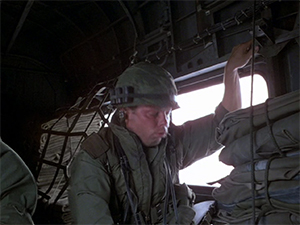 292 |
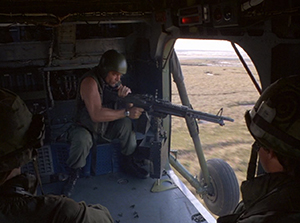 293 |
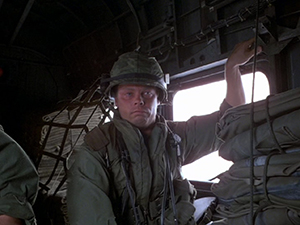 294 |
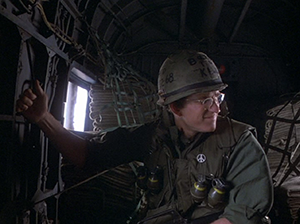 295 |
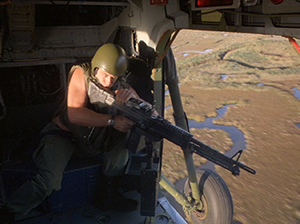 296 |
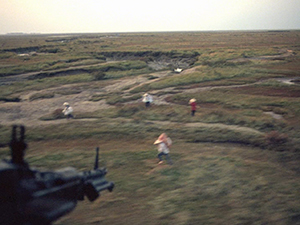 297 |
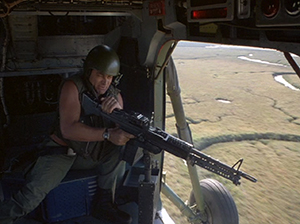 298 |
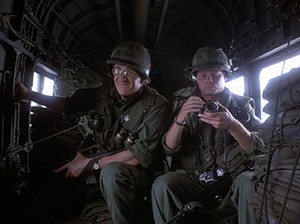 299 |
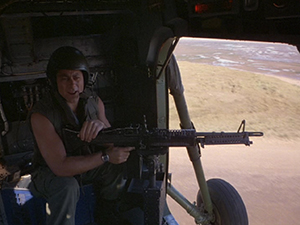 300 |
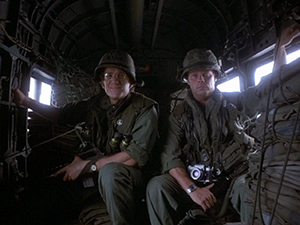 301 |
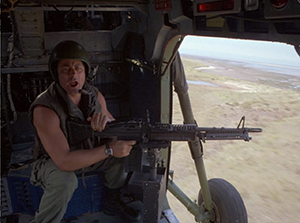 302 |
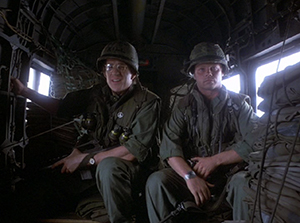 303 |
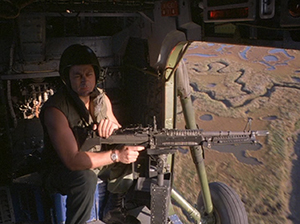 304 |
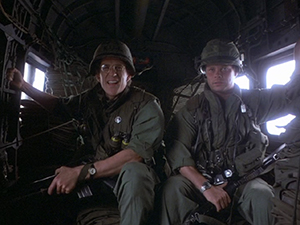 305 |
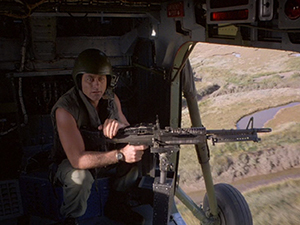 306 |
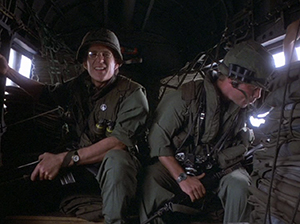 307 |
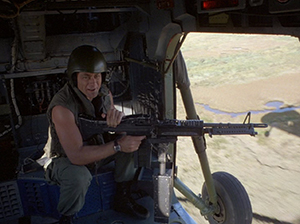 308 | |
The quote about how to tell who's a VC isn't in the novel, nor is it in the screenplay, though the screenplay does have a story about an incident in which captives are pushed out of a plane in which they ride. There are similar murders related in the 1972 documentary Winter Solder which does also have the story of how to tell a VC. It would seem Kubrick has gotten this scene from that documentary.
From Winter Soldier:
VETERAN: I was a helicopter COBRA gunship pilot. I worked with another aircraft at all times in what was called a hunter-killer team. I was told by the other pilots in the unit how to tell a VC from a civilian, uhm, if they were running they were VC, if they were standing there they were well disciplined VC, shoot 'em anyhow.
The helicopter gunner does kill a farmer in the book. The film has taken this event and used it as an opportunity to broach the killing of civilians en masse, whereas the killing of civilians in the book are more intimate events. For instance, when we eventually get the story of Joker's first confirmed kill it too was an elderly farmer holding, in each hand rice shoots he was planting.
From the book:
As we near Hue, the door gunner smokes marijuana and fires his M-60 machine gun at a farmer in the rice paddies below. The door gunner has long hair, a bushy moustache, and is naked except for an unbuttoned Hawaiian sport shirt. On the Hawaiian sport shirt are a hundred yellow hula dancers.
The hamlet beneath us is in free fire zone--anybody can shoot at it at any time and for any reason. We watch the farmer run in the shallow water. The farmer knows only that his family needs some rice to eat. The farmer knows only that the bullets are tearing him apart.
He falls, and the door gunner giggles.
In the book, as Joker and Rafter Man watch as the gunner kills the farmer, we don't know yet about Joker's first kill, and that it too was an old farmer, who he must be thinking about as the gunner shoots this old man. Immediately before his first kill, Joker had just seen a Marine blown apart and was packed with adrenaline, "black rage" pounding in his chest as he scanned the trees hoping for payback. Then the old man appeared with the rice shoots in each hand.
He saw the frantic children with their fat burden of death and felt sorry for us. So he smiled to show that he understood what we were going through. Then my M-16 was vibrating and invisible metal missiles were snapping through the ancient farmer's body as though he were a bag of dry sticks.
The ancient farmer looked at me. As he fell forward into the dark water his face was tranquil and I could see that he understood.
After my first confirmed kill I began to understand that it was not necessary to understand. What you do, you become. The insights of one moment are blotted out by the events of the next. And no amount of insight could ever alter the cold, black fact of what I had done. I was caught up in a constricting web of darkness, and, like the ancient farmer, I was suddenly very calm, just as I had been calm when the mine detonated, because there was nothing I could do. I was defining myself with bullets; blood had blemished my Yankee Doodle dream that everything would have a happy ending, and that I, when the war was over, would return to hometown America in a white silk uniform, a rainbow of campaign ribbons across my chest, brave beyond belief, the military Jesus.
In the book, Joker never inquires of anyone how they can shoot women and children.
Winter Soldier is a document of what was called the Winter Soldier Investigation, January 31 to February 2, 1971, which was in response to the news about My Lai. The public inquiry was organized by the Vietnam Veterans against the War in order to reveal that My Lai was not a novel event, that atrocities were routine. More than 125 veterans testified.
A part of the conversation is from Michael Herr's Dispatches, the gunner stating that a story ought to be done on him sometime, because he's so good, and listing his kills.
Kubrick wasn't interested in making a film about the American military committing atrocities. He wanted to make a film about the horrors of war. Included in the horrors of war are atrocities committed on both sides, so with Joker and Rafter Man on their way to take a look at the massacre of civilians by the NVA (Viet Cong in the book), he consolidates into one event the killing of Vietnamese civilians, by American troops, in The Short-timers. First we see an American killing Vietnamese in their rice fields, then we see bodies of Vietnamese who had been killed by the Viet Cong, both thus becoming linked.
As if by mistake, in the opening credits section of The Shining, the shadow of the helicopter filming the VW traveling up to the Overlook Hotel can be observed. Joker is on his way to join up with Joker's Hotel company and we see the helicopter's shadow in shot 308. It may have nothing to do with The Shining but I thought I'd mention it.
309 Crossfade to the helicopter (number 23) landing, Joker and Rafter Man leaping out and crossing the grassland, a red chemical mist in the background, as wounded Marines are carried past them to the helicopter. They pass a couple of other helicopters that don't have ID numbers on the tails. (1:00:11)
JOKER (to Marine on radio):
Top, we wanna get in the shit.
MASTER SERGEANT: Down the road. Two-Five.
JOKER:
Two-Five. Outstanding. Thanks, Top.
310 Crossfade to a long canal. On the left side are incoming Marines. On the right side are evacuating Vietnamese. A brief effect of the crossfade has Joker and Rafter Man crossing over the canal from left to right. A helicopter flies over, passing through smoke, its reflection appearing briefly in the canal. (1:01:00)
311 MS of Touchdown walking towards the camera. Joker and Rafter Man catch up with him fro behind. (1:01:15)
JOKER:
Excuse me. Sir. We're looking for 1st Platoon, Hotel Two-Five. I got a bro named Cowboy there.
TOUCHDOWN:
You people one-one?
JOKER:
No, sir. We're reporters from Stars and Stripes.
TOUCHDOWN:
Stars and Stripes?
JOKER:
Yes, sir.
TOUCHDOWN:
I'm Cowboy's platoon commander. Cowboy's just down the road in the platoon area.
JOKER:
You mind if we tag along, sir?
TOUCHDOWN:
No problem. Welcome aboard. By the way, my name's Schinoski. Walter J. Schinoski. My people call me Mr. Touchdown. I played ball for Notre Dame.
JOKER:
Notre Dame?
TOUCHDOWN: Yeah.
JOKER:: All right.
TOUCHDOWN: You here to make Cowboy famous?
JOKER:
Hah! Never happen, sir.
TOUCHDOWN:
Well, if you people came looking for a story, this is your lucky day. We got Condition Red and we're definitely expecting rain.
JOKER:
Outstanding, sir. We taking care of business?
TOUCHDOWN: Well, the NVA are dug in deep. Hotel Company's still working this side of the river, street by street and house by house. Charles definitely got his shit together but we're still getting some really decent kills here.
JOKER:
We heard some scuttlebutt, sir, about the NVA executing a lot of gook civilians.
TOUCHDOWN:
That's affirmative. I saw some bodies about a half a klick this side of Phu Cam Canal.
JOKER (hands him a map):
Will you show me where, sir?
TOUCHDOWN:
Here's the canal.
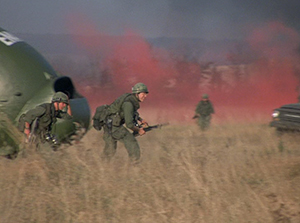 309 |
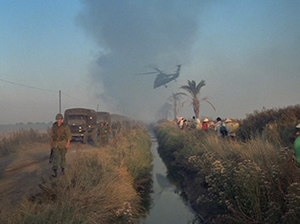 310 |
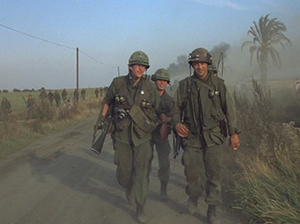 311 |
|
312 CU of Joker as he gazes in disgust down at the off-screen trench filled with dead Vietnamese. The camera does a long zoom out revealing white-covered bodies in a trench and journalists and others to either side of the trench. Some have covered their faces with white or black coverings against the smell. We observe a female cinematographer. Ruins soundtrack. (1:02:40)
JOKER (voice over): The dead have been covered with lime. The dead know only one thing, it is better to be alive.
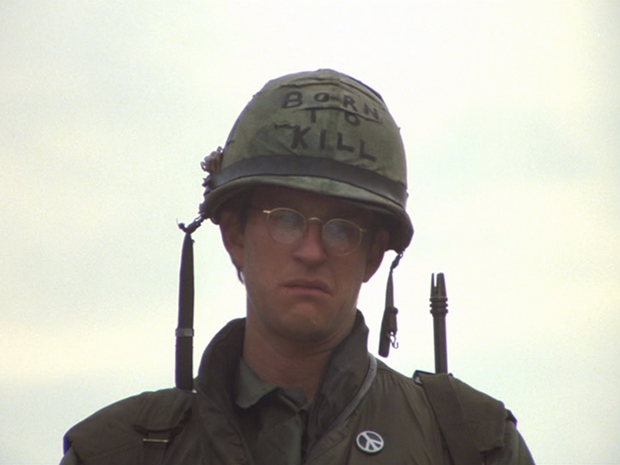
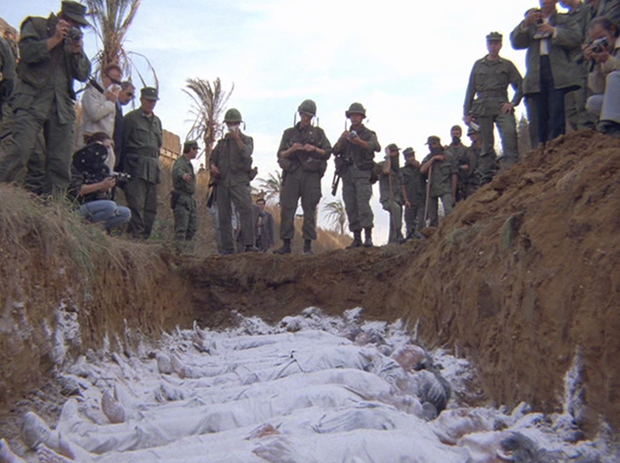
313 Joker and Rafter Man from the rear, the bodies in the trench before them. (1:03:16)
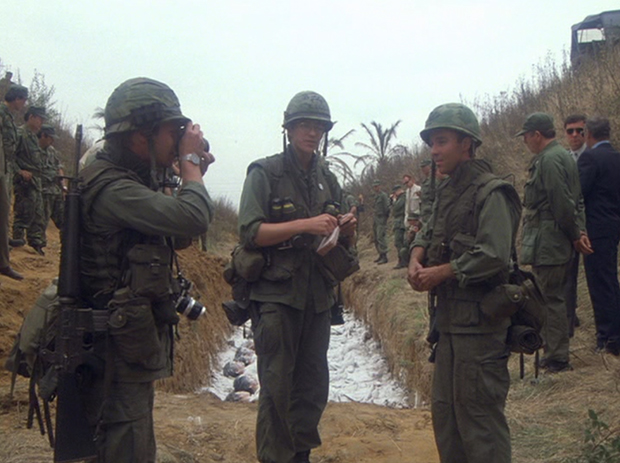
JOKER (to a Marine who has turned to walk away):
Excuse me? Good morning, lieutenant.
CLEVES: Morning.
JOKER: I make it 20. Is that the official body count, sir?
CLEVES:
What outfit are you men with?
JOKER:
Sir, we're reporters from Stars and Stripes.
CLEVES (mood changing, smiling for the camera): Oh, I see.
JOKIER: I'm Sergeant Joker and this photographer is Rafter Man.
CLEVES:
I'm Lieutenant Cleves and I'm from Hartford, Connecticut.
JOKER: Have you got a body count, sir?
CLEVES:
We think it's 20.
JOKER:
Do you know how it happened, sir?
CLEVES (continuing to smile for the camera): Well, it seems the NVA came in with a list of gook names. Government officials, policemen, ARVIN officers, school teachers. They went around to their houses real polite and asked them to report the next day for political reeducation. Everybody who turned up got shot. Some they buried alive.
COLONEL (taking notice and calling from the side:)
Ready.
JOKER (and Rafter Man and Cleves salute as the Colonel approaches):
Colonel.
COLONEL:
Marine, what is that button on your body armor?
314 MCU of Joker. (1:04:12)
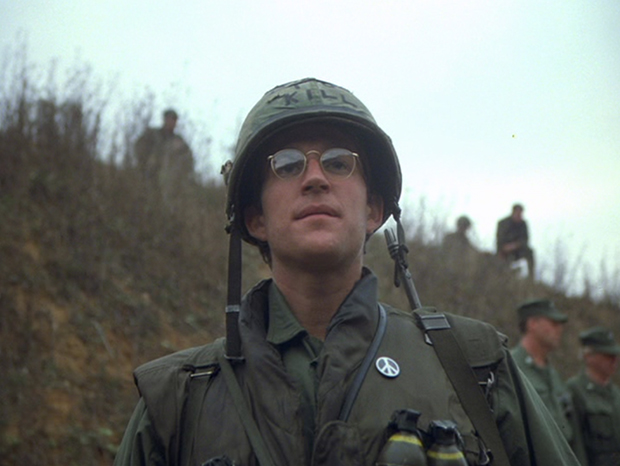
JOKER
A peace symbol, sir.
COLONEL (off screen):
Where did you get it?
JOKER:
I don't remember, sir.
315 MS of Joker and the Colonel, the bodies in the trench beyond. (1:04:17)
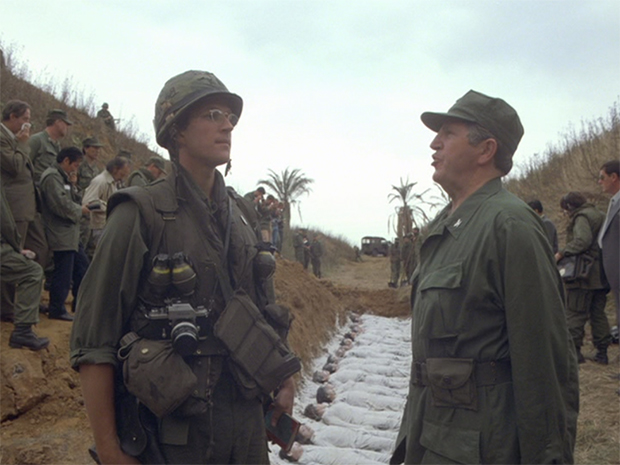
COLONEL: What is that you've got written on your helmet?
JOKER:
Born to kill, sir.
COLONEL:
You write born to kill on your helmet and you wear a peace button. What's that supposed to be, some kind of sick joke?
JOKER:
No, sir.
COLONEL:
What is it supposed to mean?
JOKER:
I don't know, sir.
316 MCU of the Colonel from Joker's right. (1:04:30)
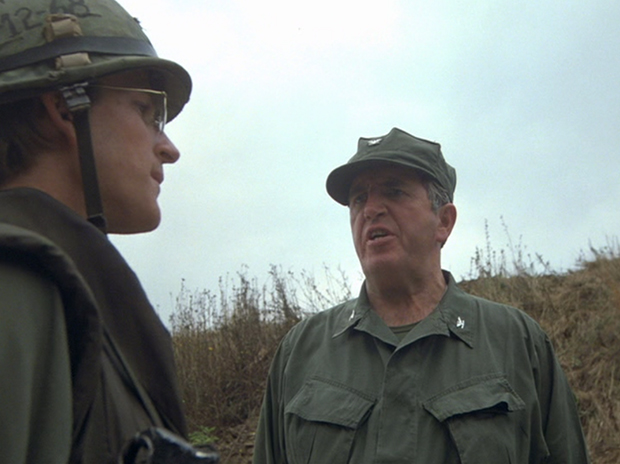
COLONEL:
You don't know very much.
JOKER:
No, sir.
COLONEL:
You better get your head and your ass wired together or I will take a giant shit on you.
JOKER:
Yes, sir.
COLONEL: Now answer my question or you'll be standing tall before the man.
JOKER:
I think I was trying to suggest something about the duality of man, sir.
COLONEL:
The what?
JOKER: The duality of man. The Jungian thing, sir.
COLONEL (momentarily at a loss for words): Whose side are you on, son?
JOKER: Our side, sir.
COLONEL: Don't you love your country?
JOKER: Yes, sir.
COLONEL: How about getting with the program. Why don't you jump on the team and come on in for the big win.
JOKER: Yes, sir.
317 MS of Joker and the Colonel, the bodies in the trench beyond, as in shot 315, but Joker's Peace button isn't observed. (1:04:55)
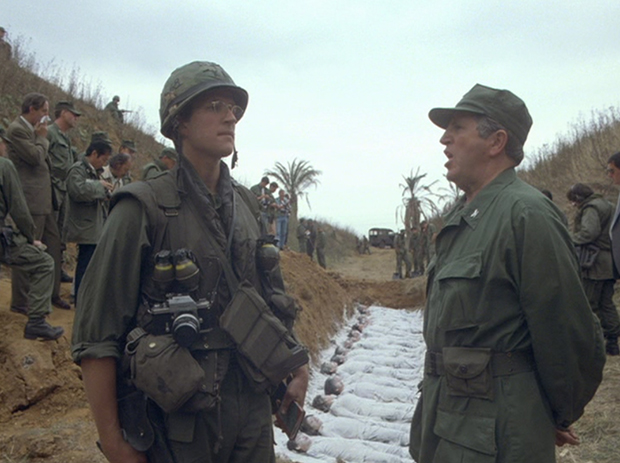
COLONEL:
Son, all I've ever asked of my Marines is for them to obey my orders as they would the word of God. We are here to help the Vietnamese because inside every gook there is an American trying to get out. It's a hardball world, son. We've gotta try to keep our heads until this peace craze blows over. (Salutes).
JOKER (salutes):
Aye, aye, sir.
Hue is by no means the "netherlands"--with a population of 140,000 in 1968, seat of the Imperial Palace of the Nguyen Dynasty until 1945--but, as with other films of Kubrick's, he has Joker on a journey to a place removed from everyday society. In The Shining, that journey was to The Overlook Hotel, and Joker is on his way to join up with Cowboy of Hotel Company. In Eyes Wide Shut, Bill's journey eventually took him to Somerton, after which he had to try to process how that related to his life and how it would change his view of the world. In A Clockwork Orange, it was Alex's Ludovico treatment that separated him from the world, taking away his free will, putting him in a situation where he had to confront the ghosts of his past. Essentially, the netherworld into which these individuals journey are places where they have to face their personal demons, or in Bill's case, discover he's not quite the man he thinks himself to be when removed from his everyday environment.They all move toward confronting what's in the shadows, thus we have in this section the idea of duality addressed. Joker, in a somewhat different situation from other Kubrick characters, has already been to hell, back on Parris Island. He has a certain level of awareness of the dark side and what's in him. He not only turned his back on Pyle and bullied him, he was part of the system instructing Pyle on how to be a killer, even before he had become comfortable with his own rifle, and Pyle went psycho as Hartman's perfect killer who would kill his enemy, which was Hartman. But he permitted Joker to live. Joker is transporting all this baggage with him into a place where he'll confront it again, and he's a character who's aware he has this baggage.
In the book, after the Battle of Hue, when Joker is leaving--exhausted by the deaths, just following is confrontation with the Colonel who promises to knock him back to being a Grunt for wearing the peace symbol--he catches a ride a man driving a deuce-and-a-half truck who "tells me about a mathematical system he has devised which he will use to break the bank in Las Vegas as soon as he gets back to the World". This is also how we know Kubrick is carrying us further and further away from the "world", for in the movie the establishment next to where Joker and Rafter Man encounter the prostitute in Da Nang, where the camera theft occurs, is named Las Vegas. The driver has meant "the World", as in the real world for the Marines being back in the United States, but in respect of the film the World becomes Da Nang, where Joker and Rafter Man sat at a sidewalk cafe drinking their "33" Vietnamese brews.
There's a long line of refugees fleeing Hue, the netherworld, and on the other side of the canal from them there's the long line of the military moving toward it, including Joker.
For the audience, however, the trip to the netherlands may be disconcerting, for though we feel Joker is being moved further and further from everyday life, suddenly we find him surrounded by civilian media at the trench holding those murdered by the Viet Cong, who are there to record, to carry the story back to the world. The presence of civilians with their cameras, men in suits, seems almost stranger and more incongruous than the line of bodies in the trench, covered with white lime.
From the book:
A CBS camera crew appears, surrounded by star-struck grunts who strike combat-Marine poses, pretending to be what they are. They all want Walter Cronkite to meet their sisters. In white short-sleeved shirts the CBS cameramen hurry off to photograph death in living color.
I stop a master sergeant. "Top, we want to get into the shit."
The master sergeant is writing on a piece of yellow paper on a clipboard. He doesn't look up, but jerks his thumb over his shoulder. "Across the river. One-Five. Get a boat ride by the bridge." "One-Five? Outstanding. Thanks, Top."
The master sergeant walks away, writing on the yellow paper. He ignores four skuzzy grunts who run into the compound, each man holding up one corner of a poncho. On the poncho is a dead Marine. The grunts are screaming for a corpsman and when they put the poncho down, very gently, a pool of dark blood pours out onto the concrete deck.
Rafter Man and I hurry down to the River of Perfumes. We talk to a baby-faced Navy ensign who souvenirs us a ride on a Vietnamese gunboat ferrying reinforcements to the Vietnamese Marines. As we skim down the river Rafter Man asks, "Are these guys any good?"
I nod. "The best the Arvins got. They're not as tough as the Korean Marines, though. The ROK's are so hard that they got muscles in their shit. The Blue Dragon Brigade. I was on an op with them down by Hoi An."
A shot pops from the shore. The bullet buzzes over.
The gunboat crew opens up with a fifty-caliber machine gun and a forty mike-mike cannon. Rafter Man watches with joy in his eyes as the bullets knock up thin stalks of water along the river bank. He holds his piece at port arms, first to fight.
In the book, Joker meets Robert M. Bayer, Shortround, while looking for One-Five. In the film, Bayer becomes instead Walter J. Schinoski, or Touchdown, who played for Notre Dame: his identity as a person who is short is exchanged for an athlete. He gives his full name in case the Stars and Stripes might report on him.
The Strawberry Patch, a large triangle of land between the Citadel and the River of Perfumes, is a quiet suburb of Hue. We get off the gunboat at the Strawberry Patch and wander around with the Vietnamese Marines until we see a little Marine with an expensive pump shotgun slung across his back, a case of C rations on his shoulder, and DEADLY DELTA on his flak jacket.
I say, "Hey, bro, where's One-Five?"
The little Marines turns, smiles.
I say, "You need a huss with that?"
"No thanks, Marine. You people One-One?"
"No, sir," I say. Officers do not wear rank insignia in the field but snuffies learn to fix a man's rank by his voice. "We're looking for One-Five. I got a bro in the First Platoon. They call him Cowboy. He wears a cowboy hat."
"I'm Cowboy's platoon commander. The Lusthog Squad is in the platoon area up by the Citadel."
We walk along with the little Marine.
"I'm Joker, sir. Corporal Joker. This is Rafter Man. We work for Stars and Stripes."
"My name is Bayer. Robert M. Bayer the third. My people call me Shortround, for obvious reasons. You here to make Cowboy famous?"
I laugh. "Never happen."
At the site of the massacred individuals, again Joker meets an individual who gives his full name and hometown, in case he makes it into the "Stars and Stripes". The scene feels almost sacred, religious, the dead ghostly with white lime.
From the book, the photographing atrocities committed by the Viet Cong scene:
The next morning, Rafter Man and I get the map coordinates of a mass grave from some green ghouls and we hump over to the site to get Captain January his atrocity photographs.
The mass grave smells really bad--the odor of blood, the stink of worms, decayed human beings. The Arvin snuffies doing the digging in a school yard have all tied olive-drab skivvy shirts around their faces, but casualties due to uncontrollable puking are heavy.
We see corpses of Vietnamese civilians who have been buried alive, faces frozen in mid-scream, hands like claws, the fingernails bloody and caked with damp earth. All of the dead people are grinning that hideous, joyless grin of those who have heard the joke, of those who have seen the terrible secrets of the earth. There's even the corpse of a dog which Victor Charlie could not separate from its master.
There are no corpses with their hands tied behind their backs. However, the green ghouls assure us that they have seen such corpses elsewhere. So I borrow some demolition wire from the Arvin snuffies and, crushing the stiff bodies with my knee until dry bones crack, I bind up a family, assembled at random from the multitude--a man, his wife, a little boy, a little girl, and, of course, their dog. As a final touch, I wire the dog's feet together.
“Every good quality has its bad side, and nothing that is good can come into the world without directly producing a corresponding evil. This is a painful fact...” -- Carl Jung
"Until you make the unconscious conscious, it will direct your life and you will call it fate." -- Carl Jung
“The psychological rule says that when an inner situation is not made conscious, it happens outside as fate. That is to say, when the individual remains undivided and does not become conscious of his inner opposite, the world must perforce act out the conflict and be torn into opposing halves.” -- Carl Jung
“There is no generally effective technique for assimilating the shadow. It is more like diplomacy or statesmanship and it is always an individual matter. First one has to accept and take seriously the existence of the shadow. Second, one has to become aware of its qualities and intentions. This happens through conscientious attention to moods, fantasies and impulses. Third, a long process of negotiation is unavoidable.” -- Carl Jung
Joker hasn't removed his peace symbol, and he's not yet so deep into the shit that it doesn't attract attention. Interviews of Marine veterans reveal that the deeper in the shit you were, the more freedom you had for self-expression, because people ceased to care what you were wearing.
In the book, during the confrontation over the peace symbol there is no mention of duality. The confrontation doesn't happen at the site of the massacre. It takes place after the first of the two sniper incidents in the novel. Joker has already killed the female sniper, and Rafter Man has just died. The battle of Hue is over and Joker will soon be on his way to Khe Sanh. So the rewriting for the film has consolidated that time in-between Hue and Khe Sanh into Joker's journey to Hue to join up with Joker as a war correspondent:
I'm dirty, unshaven, and dead tired.
A Mighty Mite slams on its brakes. "MARINE!"
I turn, thinking I've got some slack, thinking I've got a ride.
A poge colonel pounces out of the jeep, marches up to face me. "MARINE!"
I think: Is that you, John Wayne? Is this me? "Aye-aye, sir."
"Corporal, don't you know how to execute a hand salute?"
"Yes, sir." I salute. I hold the salute until the poge colonel snaps his hand to his starched barracks cover and I hold the salute for an extra couple of second before cutting it away sharply. Now he poge colonel has been identified as an officer to any enemy snipers in the area.
"Corporal, don't you know how to stand to attention?"
Right away I start wishing I was back in the shit. In battles there are no police, only people who want to shoot you. In battles there are no poges. Poges try to kill you on the inside. Poges leave your body intact because your muscles are all they want from you anyway.
I stand to attention, wobbling slightly beneath the sixty pounds of gear I'm humping.
The poge colonel has a classic granite jaw. I'm sure that the Marine Corps must have a strict examination at the officers' candidate school at Quantico designed to eliminate all officer candidates who lack the granite jaw.
His jungle utilities are razor-creased, starched to the consistency of green armor. He executes a flawless Short Pause, a favorite technique of leaders of men, designed to inflict its victim with fatal insecurity. Having no desire to damage the colonel's self-confidence, I respond with my best Parris Island rendition of I-am-only-an-enlisted-person-I-try-to-be-humble.
"Marine..." The colonel stands ramrod straight. This stance is the Air of Command, intended to intimidate me, despite the fact that I'm a foot taller and outweigh him by fifty pounds. The colonel investigates the underside of my chin. "Marine..." He likes that word. "What is that on your body armor, Marine?"
"Sir?"
The poge colonel stands on tiptoe. For a moment I'm afraid he's going to bite me in the neck. But he only wants to breathe on me. His smile is cold. His skin is too white. "Marine..."
"Sir?"
"I asked you a question."
"You mean this peace button, sir?"
"What is it?"
"A peace symbol, sir..."
I wait patiently while the colonel tries to remember the "Maintaining Interpersonal Relationships with Subordinate Personnel" chapter of his OCS textbook.
The poge colonel continues to breathe all over my face. His breath smells of mint. Marine Corps officers are not allowed to have bad breath, body odor, acne pimples, nor holes in their underwear. Marine Corps officers are not allowed to have anything that has not been issued to them.
The colonel jabs my button with a forefinger, gives me a fairly decent Polished Glare. His blue eyes sparkle. "That's right, son, act innocent. But I know what that button means."
"Yes, sir!"
"It's a ban-the-bomb propaganda button. Admit it!"
"No, sir." I'm in real pain. The man who invented standing at attention obviously never humped any gear.
"Then what does it mean?"
"It's just a symbol for peace, sir."
"Oh, yeah?" He breathes faster, up close now, as though he can smell lies.
"Yes, Colonel, it's just--"
"MARINE!"
"AYE-AYE, SIR!"
"WIPE THAT SMILE OFF YOUR FACE!"
"AYE-AYE, SIR!"
The poge colonel moves around me, stalks me. "Do you call yourself a Marine?"
"Well..."
"WHAT?"
"Crossed fingers, king's-X. "Yes, sir."
"Now seriously, son..." The colonel begins an excellent Fatherly Approach. "Just tell me who gave you that button. You can level with me. You can trust me. I only want to help you." The poge colonel smiles.
The colonel's smile is funny so I smile, too.
"Where did you get that button, Marine?" The colonel looks hurt. "Don't you love your country, son?"
"Well..."
"Do you believe that the United States should allow the Vietnamese to invade Viet Nam just because they live here?" The poge colonel is struggling to regain his composure. "Do you?"
My shoulders are about to fall off. My legs are falling asleep. "No, sir. We should bomb them back to the Stone Age...sir."
"Confess, Corporal, confess that you want peace."
I give him a Short Pause. "Doesn't the colonel want peace...sir?"
The colonel hesitates. "Son, we've all got to keep our heads until this peace craze blows over. All I have ever asked of my boys is that they obey my orders as they would obey the word of God." "Is that a negative...sir?"
The poge colonel tries to think of some more inspiring things to say to me, but he has used them all up. So he says, "You can't wear that button, Marine. It's against regulations. Remove it immediately or you will be standing tall before the man."
Somewhere up in Heaven, where the streets are guarded by Marines, Jim Nabors, in his Gomer Pyle uniform, sings: "From the halls of Montezuma...to the shores of Tripoli..."
"MARINE!"
"YES, SIR!"
"WIPE THAT SMILE OFF YOUR FACE!"
"AYE-AYE, SIR!"
"The Commandant has ordered us to protect freedom by allowing the Vietnamese to live like Americans all they want to. As long as Americans are in Viet Nam the Vietnamese will have the right to express their political convictions without fear of reprisal. So I will say it one more time, Marine, take off that peace button or I will give you a tour of duty in Portsmouth Naval Prison."
I stay at attention.
The poge colonel remains calm. "I am going to cut a new set of orders on you, Corporal. I am personally going to demand that your commanding officer shit-can you to the grunts. Show me your dogtags."
I dig out my dogtags and I tear off the green masking tape around them and the poge colonel writes my name, rank, and serial number into a little green notebook.
"Come with me, Marine," says the poge colonel, putting the little green notebook back into his pocket. "I want to show you something."
I step over to the jeep. The poge colonel pauses for dramatic effect, then pulls a poncho off a lump on the back seat. The lump is a Marine lance corporal in the fetal position. In the lance corporal's neck are punctures--many, many of them.
The poge colonel grins, bares his vampire fangs, takes step toward me.
I punch him in the chest with my wooden bayonet.
He freezes. He looks down at the wooden bayonet. He looks at the deck, then at the sky. Suddenly his wristwatch is very interesting. "I...uh...I've got no more time to waste on this unprofitable encounter...and get a haircut!"
I salute. The poge colonel returns my salute. We hold the salute awkwardly while the colonel says, "Someday, Corporal, when you're a little older, you'll realize how naive--"
The poge colonel's voice breaks on "naive."
I grin. His eyes fall.
Both salutes cut away nicely.
"Good day, Marine," says the poge colonel. Then, armored in the dignity awarded him by Congress, the colonel marches back to his Mighty Mite, climbs in, and drives away with his bloodless lance corporal.
The poge colonel's Mighty Mite lays rubber--after all that talking he doesn't even give me a ride.
"YES, SIR!" I say. "IT IS A GOOD DAY, SIR!"
The war goes on. Bombs fall. Little ones.
An hour later a deuce-and-a-half slams on its brakes.
I climb up into the cab with the driver.
During the bumpy ride back to Phu Bai the driver of the deuce-and-a-half tells me about a mathematical system he has devised which he will use to break the bank in Las Vegas as soon as he gets back to the World.
As the driver talks the sun goes down and I think: Fifty-four days and a wake-up.
What's this? In the book the Colonel has vampire fangs? And Hartman, before dying, had a werewolf smile? I've read that Hasford's book, early on, actually had werewolves, and that a friend of his convinced him to take them out. It's a better work for his having done so and instead moves into surrealism, sweeping the veil back to reveal a truth behind the seeming reality.
The Colonel was right in that the peace symbol was originally designed in 1949, by Gerald Holtom, for the British Campaign for Nuclear Disarmament. The circle encloses the flag semaphore symbols for the letters N and D, merged.
Dualities are everywhere in Kubrick's work, in his doubles and mirrorings. We have the obvious duality of the inept and good-natured Pyle transforming into the killer who takes Hartman's life and his own, and the Jack who undergoes the full transformation at the Overlook into the man who attempts to kill Wendy and Danny, the bad Alex who becomes the Alex who is unable to defend himself without free will. There is the very obviously expressed duality in Fear and Desire of Lt. Corby and Pvt. Fletcher literally facing themselves as the enemy General and Captain when they kill them. And then there are the less obvious examples such as Dave and Frank in 2001, and Alex and the writer, Alexander, who he attacks, and who later drugs Alex and attempts to drive him to suicide.
Joker, in the novel, as he faces off with the colonel, briefly thinks, "Is that you, John Wayne? Is this me?", from which the idea may have come to have this be the moment, in the film, when the idea of duality is voiced. Joker is conscious of dualities, and of his own, whereas the colonel hasn't a clue.
In the novel, the character of Joker finds, a few days after his confrontation with the colonel, that he has busted down to a Grunt and becomes one of Cowboy's Lusthogs, in Khe Sanh, as an assistant squad leader.
Approx 16,500 words or 33 single-spaced pages.
Next: Full Metal Jacket Analysis - Part 4
Go to Table of Contents for Analysis of "Full Metal Jacket"
Link to the main TOC page for all the analyses